No. 5
March 2023
Peoples Seek Alternatives to War Preparations in East Asia
Korean People Oppose U.S.-Republic of Korea Military Drills
Democratic People's Republic of Korea Counters War Exercises That Threaten Its Right to Be
All Out to Support Korea Peace Appeal!
Dangerous U.S. Aim to Create Asian NATO
Australia, UK and U.S. Security Pact Consolidates U.S. Striving for Domination in Asia Pacific
Filipinos Stand Firm Against U.S.
Military Expansion
and
Provocations
New People's Army Marks 54th Anniversary
Second U.S. Summit for Democracy
An Even Paltrier Version of the First
International Meetings and Fora
Joint Statement Between China and Russia
G20 Foreign Ministers' Meeting in New Delhi, India, March 1 and 2
Attempts to Impose Anti-Russia and Anti-China Agenda on International Fora Continue
News in Brief
Russia Issues New Detailed Foreign Policy
Recent Moves Away from U.S. Dollar Dominance
French President Macron and President
of
European Union Visit China
Peoples Seek Alternatives to War Preparations in East Asia
Korean People Oppose U.S.-Republic of
Korea
Military Drills
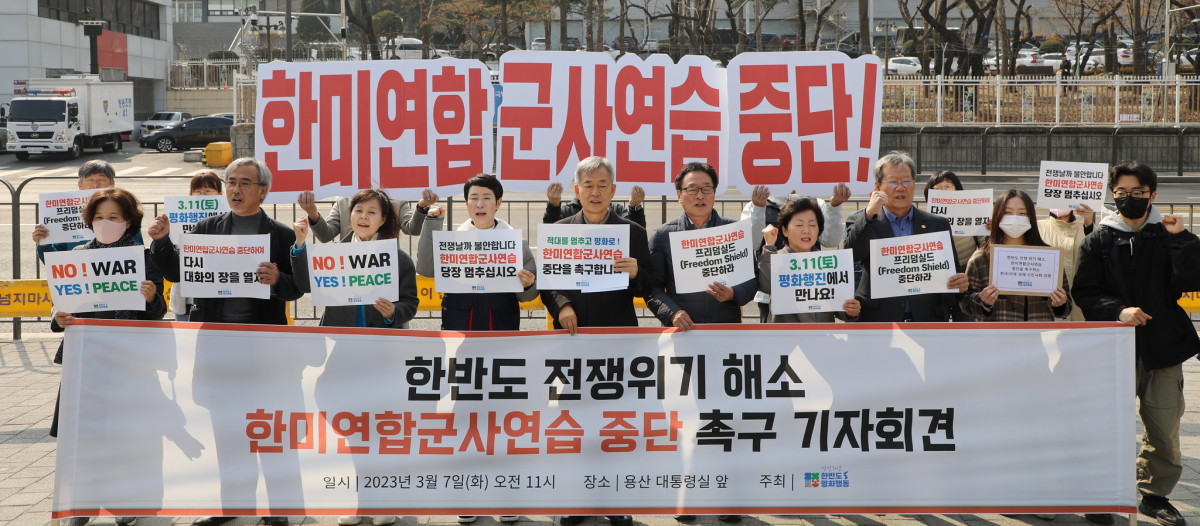
Press conference and
picket in Seoul, March 7, 2023, calls for end to U.S.- ROK military
exercises
The U.S. and the Republic of Korea (ROK) conducted the Freedom Shield joint military exercises in south Korean territory from March 13 to 23. This was the largest U.S.-ROK military exercise in five years.
The people of the Korean Peninsula, in both north and south, firmly expressed their opposition to these war exercises which threaten peace and stability on the Korean Peninsula and endanger all their lives. Besides the people and the government of the Democratic People's Republic of Korea (DPRK) speaking with one voice against these war exercises, their compatriots in the Republic of Korea (ROK) also held regular vigils and protests in Seoul as well as in other regions, such as Jeju Island, calling for an end to all U.S.-ROK military exercises.
To criminalize and muzzle the peace movement in the south, the pro-U.S. anti-communist government of President Yoon Suk-yeol has been using the National Security Law imposed by the U.S. on the ROK in 1948 to arrest and imprison anti-war activists and anyone who expresses sympathy with the DPRK. Despite this repression, workers, teachers, students and others have stood together denouncing the Yoon government and calling for the end of these military exercises and for the U.S. to take their troops and weapons and get out of Korea.
|
The U.S. has caused -- and continues to inflict -- suffering on the Korean people for more than 70 years. It was the U.S. that unilaterally divided Korea into two, depriving the Korean people of their right to independence and self-determination after the Second War, and has since kept Korea divided by force. This includes launching the Korean War (1950-53), in an attempt to take over the entire Korean Peninsula to use as a beachhead for war and aggression against China and Russia during the Cold War.
Canada played an ignoble role by participating in this war in which four million Koreans died, where the U.S. used biological and chemical warfare against civilians and in which the DPRK was extensively carpet bombed. For 70 years the U.S. has refused to sign a peace treaty with the DPRK to replace the Korean Armistice Agreement of July 27, 1953 and formally end the Korean War and normalize relations. As part of its Indo-Pacific strategy to check China and Russia and dominate the countries and peoples of the Indo-Pacific today, the U.S. imperialists under the Biden administration maintain 28,500 troops in the Republic of Korea, have 15 U.S. military bases for which the south Koreans are made to pay and countless strategic nuclear and other weapons, and it carries out joint-military exercises against the DPRK, aggravating an already tense atmosphere on the Korean Peninsula.
The DPRK government issued a statement on February 17, stating it will be concentrating all its efforts on "implementing its own development plans and keeping peace and stability in the Korean peninsula and the region." It also pointed out that it would refrain from any military actions except the regularly scheduled exercises to maintain its sovereignty and independence. This includes regularly testing its missiles systems.
The U.S. meanwhile has announced plans to stage another joint naval drill in the East Sea of Korea in the beginning of April with the involvement of the U.S.-Japan-south Korea three-party naval forces, including the U.S. Navy's nuclear-powered aircraft carrier Nimitz.
Neither the U.S. nor its allies, including Canada, have any business carrying out military adventures around the Korean Peninsula. As Canadians, we have to make amends for Canada's illegal participation in the Korean War by standing with the DPRK and the Korean people calling for an end to all U.S.-led joint military exercises targeting the DPRK. This is part of our work to organize for an anti-war government in Canada and make Canada a Zone for Peace.
Canada's "Operation NEON," aimed at enforcing U.S.-engineered unjust sanctions against the DPRK, must be ended. The DPRK has the right to be and the Korean people have the right to self-determination and peace and a re-unified Korea of their own making.
(With files from United States Forces Korea, Government of Canada, KCNA, Hankyoreh)
Democratic People's Republic of Korea Counters War Exercises that Threaten Its Right to Be
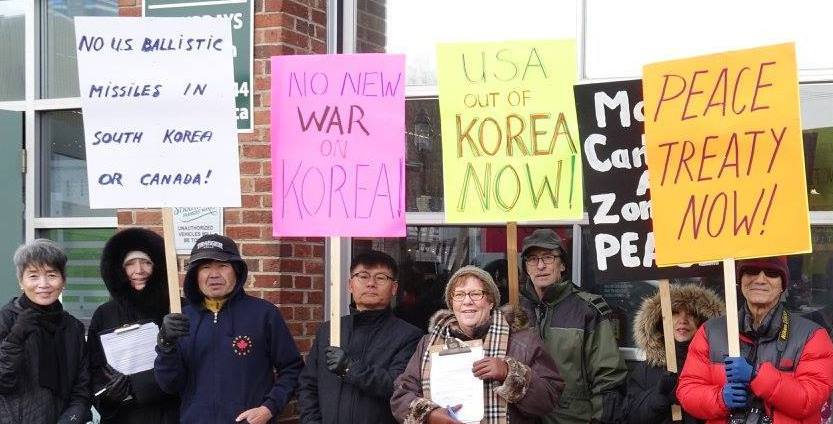
On March 16, the Democratic People's Republic of Korea (DPRK) successfully test launched the Intercontinental Ballistic Missile Hwasongpho-17. The test launch was to serve as a warning to the U.S. that the DPRK would respond firmly to the ongoing large-scale U.S.-Republic of Korea (ROK) joint military exercises being conducted March 13 to 23, called Freedom Shield.
Rodong Sinmun, the newspaper of the Worker's Party of Korea (WPK), reported that from March 21 to 23, a new unmanned nuclear assault underwater craft called 'Haeil' was also successfully tested. This strategic weapon, developed over a ten-year period, is designed to infiltrate the enemy's operational waters and cause maximum damage to its naval strike groups as well as operational supply depots and ports.
The DPRK also conducted a drill on March 22 to test cruise missiles as part of tactical nuclear missions. Rodong Sinmun added that these weapons tests were conducted to let the U.S. and the ROK know that in the event of a confrontation, they would get more than they bargained for and that they should immediately stop their "reckless anti-DPRK war drills."
The launch of the Hwasongpho-17 missile and other weapons tests are a direct consequence of the ongoing provocations by the U.S. imperialists against the state and security of the DPRK. This year alone, 20 joint military exercises are planned involving the U.S., ROK, Japan, Australia and others. All are targeted at invading the DPRK, overthrowing its socialist system and taking over the entire Korean Peninsula to use as a launching pad for war against China and Russia.
While the U.S./NATO forces and the media in Canada and abroad, including the CBC, present the DPRK as an aggressor and create doubt about its desire for peace, the facts tell otherwise. Rodong Sinmun noted that the "grave challenging situation against the state security of the DPRK requires it to have stronger war deterrents for firmly supporting its peaceful socialist state-building activities." It also added that the frequency, scope and intensity of U.S.-led war threats and aggression require that the DPRK take measures to ensure that the entire armed forces are prepared for an "all-out war."
Responding to the unfolding acts of aggression and war by the U.S. and ROK, more than a million young DPRK women and men mobilized themselves for the Korean People's Army in a recent campaign, to express their national pride and patriotism, and their determination to defend their homeland against all threats.
 TML
Monthly
calls on the Canadian people, with clear conscience, to stand with the
people of the DPRK and the democratic and peace-loving people of the
ROK who do not want a war to break out on the Korean Peninsula. The
people of the DPRK have the right to be; the people of the Korean
Peninsula have the right to self-determination and peace.
TML
Monthly
calls on the Canadian people, with clear conscience, to stand with the
people of the DPRK and the democratic and peace-loving people of the
ROK who do not want a war to break out on the Korean Peninsula. The
people of the DPRK have the right to be; the people of the Korean
Peninsula have the right to self-determination and peace.
It is the U.S./NATO, including Canada, which must be held to account for warmongering and aggression on the Korean Peninsula, and attempting to destabilize the DPRK through unjust UN Security Council sanctions and their own, engineered by the U.S. to effect regime change in the DPRK. It will not pass!
(With files from Rodong Sinmun, KCNA and DPRK Permanent Mission to the United Nations.)
All Out to Support Korea Peace Appeal!
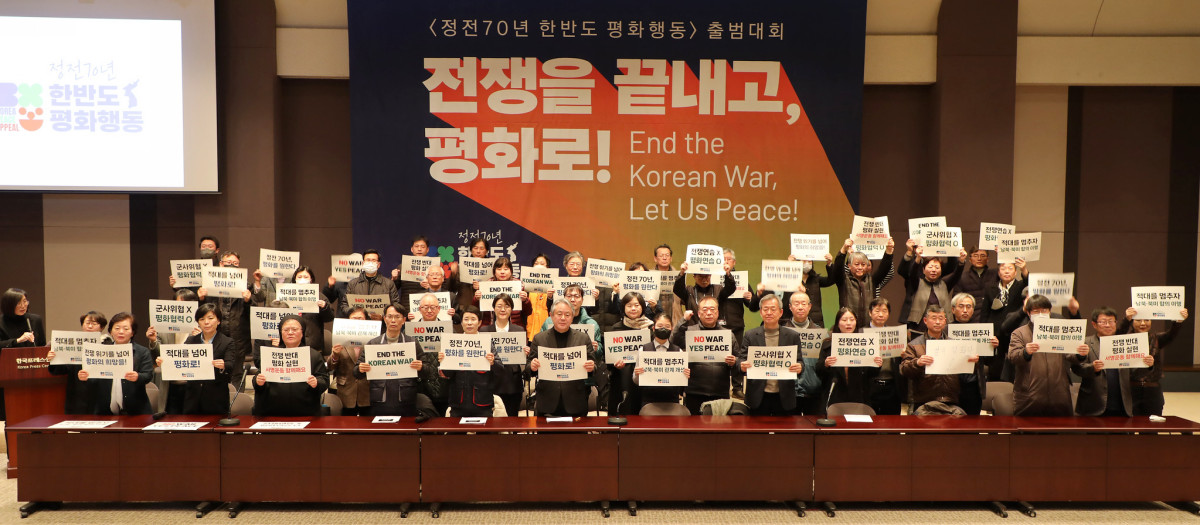
Korea Peace Appeal
Campaign launched a new project with a press conference, February 14,
2023, Korea Peace
Action for the 70th Anniversary of the Armistice
This year marks the 70th anniversary of the signing of the Korean Armistice Agreement on July 27, 1953, which ended the fighting in the Korean War. In 2020, anti-war and civil society organizations in the Republic of Korea (south Korea) launched the Korea Peace Appeal. The goal is to collect 100 million signatures over a three-year period, from the 70th anniversary of the U.S. launch of the Korean War on June 25, 1950 to the 70th anniversary of the day the Armistice Agreement was signed.
According to the organizers the "Korea Peace Appeal is an international campaign that seeks to amplify voices calling for an end to the Korean War and a transition from armistice to peace beyond the Korean Peninsula and throughout the world." The goal is to engage others through the Appeal and to present the signatures to the UN as well as to those countries which participated in the Korean War, including Canada.
Close to 400 Korean organizations from south Korea and more than 75 organizations from East Asia and around the world have endorsed the Korea Peace Appeal.
This is an important initiative reflecting the aspirations of the Korean people to end the Korean War and establish a permanent peace on the Korean Peninsula, as a contribution to peace in East Asia and the world.
TML calls on everyone to support the Korea Peace Appeal by signing online and downloading and printing a copy of the Appeal to secure the signatures of co-workers, friends and neighbours as part of Canada's contribution to the success of the campaign.
For more information about the Korea Peace Appeal and to sign, print and circulate copies of the petition, click here.
Dangerous U.S. Aim to Create Asian NATO
Since May 2022, the U.S., Japan and the Republic of Korea (ROK) have held more then two dozen high-level meetings. One of the highest profile of these meetings were the talks with Japanese Prime Minister Fumio Kishida and ROK President Yoon Suk-yeol on the sidelines of the NATO Summit in Madrid on June 29, 2022. This meeting required cajoling by the U.S. to overcome the reluctance of Japan's ruling circles to be seen as showing deference toward its former colony, and the latter not wanting to be seen as conciliating with the former colonial oppressor.
 The tripartite
meetings are meant to present a united front so
that
the U.S. can claim it has willing partners in its hegemonic aims in the
region, despite the contradictions between the ROK and Japan. These
include Japan's ongoing refusal to apologize and make reparations for
its war-time
enslavement of nearly 1 million Koreans.
The tripartite
meetings are meant to present a united front so
that
the U.S. can claim it has willing partners in its hegemonic aims in the
region, despite the contradictions between the ROK and Japan. These
include Japan's ongoing refusal to apologize and make reparations for
its war-time
enslavement of nearly 1 million Koreans.
Japan's ruling circles have their own aims to remilitarize Japan and send its troops abroad to extend its economic and military power. Creating hysteria about the Democratic People's Republic of Korea (DPRK) provides a pretext for this and massive increases to its military spending.
The meetings of the U.S., Japan and the ROK have been very focused on trying to demonize the DPRK, using the term "denuclearization of the Korean Peninsula" to blame the DPRK for the rising tensions in the area. It is the U.S. that has been bringing nuclear weapons into the ROK since 1958 in violation of the 1953 Korean Armistice Agreement. The constant threats by the U.S. have led the DPRK to develop its nuclear deterrent. This is to say nothing about the fact that the only country proven to be a nuclear threat worldwide is the U.S., which criminally used atomic bombs on Japan in 1945. Despite all of this, the U.S. has used these meetings to posture with its "unshakeable commitment" to the defence of the ROK and Japan, including recourse to the use of nuclear weapons.
At these meetings, the phrases "free and open Indo-Pacific" and "rules-based international order" are also touted. These are euphemisms for the imperialist dictate of might makes right, namely, that the warships of the U.S. and others, including the UK and Canada, can go where they please. Canada's role in enforcing an illegal naval blockade on the DPRK, the encroachment by these forces on the territorial waters of other countries, as well as provocative acts aimed at China such as sending warships through the Strait of Taiwan are all examples of this.
Despite claims by the U.S., Japan and the ROK that the aim is not to have an Asian NATO, this is precisely what is unfolding. Such an alliance is anathema to the desire of the peoples of Japan and Korea for peaceful relations and their rejection of the scourge of war. The Japanese people in the main reject attempts by the ruling circles in their country to remove the pacifist safeguards in the constitution preventing Japan's armed forces from being deployed abroad once again. The Korean people seek the peaceful reunification of their nation free from outside interference. Along with the Chinese people and others, they continue to seek meaningful restitution for the crimes of Japanese colonialism and militarism, which the ruling circles in Japan who seek to revive militarism, refuse to do. Neither the Japanese nor Korean people want U.S. bases and troops in their countries, and NATO's warmongering in Europe makes clear that an Asian NATO will not serve their interests and striving for peace.
U.S. Aggressive Role at APEC Summit
A notable event took place on November 18, 2022, on the sidelines of the Asia-Pacific Economic Cooperation (APEC) Summit, where U.S. Vice President Kamala Harris convened Prime Minister Kishida of Japan, Prime Minister Han of the ROK, Prime Minister Albanese of Australia, Prime Minister Ardern of New Zealand and Prime Minister Trudeau of Canada. It showed that besides creating an Asian NATO with Japan and the ROK, the U.S. imperialists also expect Canada, New Zealand and Australia to come to heel in support of U.S. hegemonic aims in Asia.
The pretext for the meeting was that the DPRK had tested a long-range ballistic missile. This event was presented outside the context of the DPRK's decision to develop such armaments in response to ceaseless U.S. aggression and refusal to undertake legitimate negotiations for peace since the end of the Korean War, unless forced to do so.
Instead, the White House gave a self-serving rendering of the meeting at APEC to demonize and isolate the DPRK. The U.S. claimed "that the path to dialogue remains open for the DPRK" and that the meeting "called on the DPRK to abandon needless provocation and to return to serious and sustained diplomacy."
Prime Minister Justin Trudeau's office similarly reported on his participation in the meeting with Harris: "The Prime Minister strongly condemned Pyongyang's provocation and called for continued international coordination to address the threat posed by north Korea's ongoing nuclear and ballistic missile programs."
U.S.-Led War Games Around the Korean Peninsula
Besides holding meetings with south Korea and Japan, the U.S. has stepped up tripartite war exercises with these two countries, to realize in practice a NATO-type aggressive alliance in Asia. All of these war exercises are presented as responses to activities by the DPRK, based on covering up that the U.S. remains the biggest threat to peace in the region and that the aim of such exercises is not self-defence but to prepare for U.S.-led aggression and war in Asia.
The U.S. Department of Defense reported, "From August 8-14, 2022, the United States Navy, Japan Maritime Self-Defense Force, and ROK Navy participated in a missile warning and ballistic missile search and tracking exercise during the multinational Pacific Dragon exercise off the coast of the Pacific Missile Range Facility in Hawaii."
It added that "Following the June 11 U.S.-ROK-Japan Trilateral Ministerial Meeting in Singapore, this missile warning and ballistic missile search and tracking exercise demonstrated the commitment of the U.S., ROK, and Japan to furthering trilateral cooperation to respond to DPRK challenges, protecting shared security and prosperity, and bolstering the rules-based international order."
On September 30, 2022, navies of the ROK, the U.S. and Japan staged trilateral anti-submarine exercises to the east of the Korean Peninsula. Predictably, the ROK navy said that the exercises were "designed to improve their capability to respond to increasing north Korean submarine threats, including its submarine-launched ballistic missiles (SLBM)," while the U.S. navy said the drills would enhance inter-operability and tactical and technical coordination between the three countries. The U.S. and Japanese navies also said the exercises would promote "a free and open Indo-Pacific."
These anti-submarine drills had been on hiatus since 2017 as part of efforts by the prior ROK government of Moon Jae-in to create the conditions for negotiations between the DPRK and the U.S. Current ROK President Yoon Suk-yeol, has specifically stated his aim to further embroil the ROK in "trilateral security cooperation" with the U.S. and Japan.
The three countries held a "trilateral ballistic missile defence exercise in the waters between Korea and Japan" on October 6, 2022, which the U.S. Navy said "enhances the interoperability of our collective forces and demonstrates the strength of the trilateral relationship with our Japan and ROK allies, which is forward-leaning, reflective of our shared values, and resolute against those who challenge regional stability." It also stated that in the same week, the U.S. "conducted air exercises with our ROK and Japanese Allies, as well as a joint tactical missile live-fire exercise with the ROK."
Another tripartite naval exercise was held on February 22, which was said to focus on ballistic missile information-sharing.
While the U.S. military speaks of "shared values," it is a fact that under the ROK/U.S. Combined Forces Command established in 1978, during time of war, the ROK military is subordinate to U.S. command, not unlike how Canada's military is subordinate to U.S. Northern Command. The U.S. has some 24,000 troops and 15 bases in the ROK.
Meanwhile, U.S. Forces Japan imposes 50,000 U.S. soldiers in 23 bases across Japan.
NATO-ization of Japan
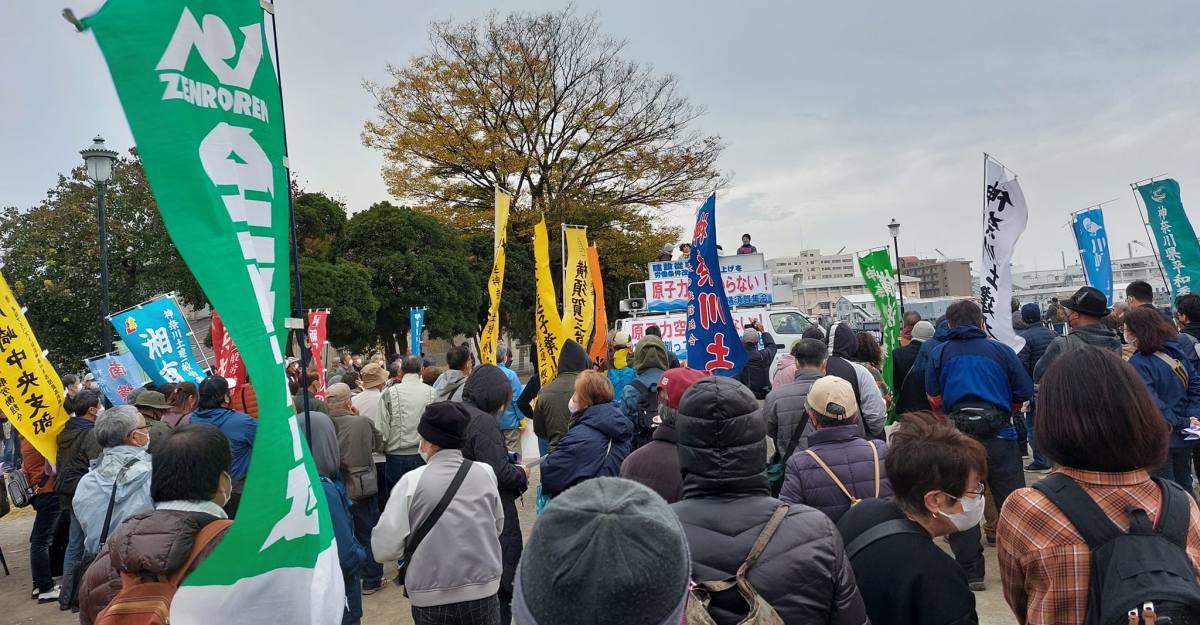
Protest, November 19,
2022 in Japan against acquiring nuclear aircraft carriers.
Alarm is growing in Japan as the ruling elite prepare for war. In conjunction with the U.S. imperialists, Japan is being drawn into the U.S./NATO war alliance. At the end of 2022, the ruling Kishida militarists announced a military budget that will bring spending up to the two per cent of GDP target demanded for membership in NATO. The situation highlights the necessity for those in NATO countries such as Canada to step up their anti-war activities including the demand to disband NATO. Canada and other NATO countries need anti-war governments and to make their nations zones of peace.
Rapid Expansion of Japan's War Budget
The Japan militarist government will raise war spending by ₯1 trillion (around CAD$10 billion) this year alone to a total of ₯6.5 trillion (CAD$65 billion). The five-year war budget "build-up plan" is to inject an additional ₯43 trillion into military spending reaching an annual 2 per cent of GDP by 2027 as demanded for membership in the aggressive U.S.-led military alliance NATO. The fiscal 2023 increased war budget of ₯6.5 trillion compares with the ₯5.5 trillion for the 2022 fiscal year, which itself is a record amount.
War spending will increase around ₯1 trillion every year over the next five years. Of the military defence spending during that time, the militarist government says ₯5 trillion will go towards standoff missiles and another ₯5 trillion for ammunition. Wikipedia defines standoff missiles as offensive weapons.[1]
Japan's Updated War Documents
The following is the gist of the war documents released by the militarist government, including its long-term policy guidelines called the National Security Strategy (NSS).
The Japanese military will acquire "counterstrike capability allowing it to strike targets in enemy territory." The enemy includes three main targets defining China as the "greatest strategic challenge," the Democratic People's Republic of Korea as a "graver more imminent threat than before," and Russia as a "serious security concern." A counterstrike capability allows Japan to hit "enemy bases and command-and-control nodes with longer-range standoff missiles."
The NSS document states, "Looking at Japan's surroundings, it is facing the most severe and complex security environment since the end of World War II" noting what it calls a growing pressure "by those seeking to unilaterally change the status quo by force." The NSS document says, "China has intensified coercive military activities around Taiwan, and concerns about peace and stability in the Taiwan Strait are rapidly increasing not only in the Indo-Pacific region, including in Japan, but also with the entire international community."
The NSS statement is made at a time U.S. imperialism still maintains 23 military occupation bases in Japan, hundreds of war planes and ships and thousands of troops. It also has military bases, naval and air forces and thousands of troops in south Korea and throughout the South Pacific. In addition despite almost unanimous opposition by elected and non-elected officials and the majority of the population in Okinawa, the Japanese militarist government is spending public funds to build new U.S. military bases and ports on the main Okinawa Island and off Kyushu on Mageshima Island.
Prime Minister Fumio Kishida said the world is currently "at a historical crossroads," which requires that Japan act with urgency. He said the new war spending including the counterstrike capability are "within the scope of the Constitution" and that the country's exclusively defence-oriented policy would remain in place. "Japan's progress as a peaceful nation will remain unchanged," he stated.
Many Japanese disagree with those words and recognize that since the defeat of the militarists in 1945, the U.S. occupation has kept the same militarist groups and families in power. The U.S. imperialists, with their dozens of military installations in Japan and vassals in economic and political power, have used the country as a staging ground and military supplier for U.S. imperialist wars in Korea and Vietnam, and to intimidate China and strive for hegemony over the entire Indo-Pacific region. The Japanese economy of industrial mass production has been integrated into the U.S. war economy.
Integration with U.S. Military and NATO
To put the first-strike capability into practice, the war documents say Japan, within five years, will extend the range of its homegrown Type-12 standoff missiles and buy U.S.-made Tomahawk cruise missiles with a range of about 1,600 kilometres. The Tomahawks are intended to fill any immediate gaps in the initial five-year plan while the range of the Type-12 missiles is extended. Total costs for the standoff capability are expected to be around ₯5 trillion.
The documents signal that the counterstrike capability is also intended to be an element of a larger plan moving Japan toward an integrated air and missile defence system, which along with expanding U.S. military bases in Japan will require increased cooperation with the U.S. military as well as NATO.
The documents also detail Japan's plans to transition to an "active cyber defence" policy that would see it dramatically expand the number of military cyber experts from a core of about 890 people currently employed to about 4,000 personnel by fiscal year 2027, with the number of Defense Ministry and active military cyber personnel altogether hitting approximately 20,000.
The two per cent war spending target, enshrined in the NSS and the ₯43 trillion plan laid out in the country's Defence Program would put Japan on par with NATO's defence spending standard. This is a departure from the country's informal cap on outlays of around one per cent of GDP and signals a willingness to join the U.S. aggressive military alliance NATO.
Sebastian Maslow, a lecturer at Sendai Shirayuri Women's College, says the revised documents expand Japan's role within its military alliance with the United States and strengthen the U.S.-led defence posture in the Indo-Pacific. These steps, Maslow says, expand bilateral defence cooperation to one where Japan openly acknowledges its role not as a "shield" but as a "sword" in its relationship with the U.S. This increase in capabilities and sophistication will enable greater integration with U.S. and partner forces at a time when Washington can no longer guarantee a favourable regional balance of power by itself, Maslow contends.
The newspaper Akahata reports that the Kishida militarist government will give the military the right to use U.S.-made missiles for first-strikes against China, Korea and Russia within the U.S. Integrated Air and Missile Defense (IAMD) air-defence network. According to the U.S. Joint Chiefs of Staff doctrine, the IAMD system is aimed at a global strike capable of destroying any target, including enemy missile bases, runways, and command/control centres, with the use of long-range precision guided weapons.
The military of the Japan government, using information provided by the U.S. military and with its direction, will launch assaults on enemy targets. The Kishida militarist government of the cartel Liberal Democratic and Komei parties admit to the possibility that Japan may engage in an enemy strike including pre-emptive attacks as part of what it calls its "exercise of the right to collective self-defence" within the U.S.-Japan military alliance. This is not just a matter of legislation. Akahata says the introduction of the IAMD system will make Japan come under the U.S. operational military control.
Within this framework of joining the IAMD system and reaching a two per cent of GDP military budget in line with NATO's previously set criteria for membership, people are speaking of the "NATO-ization of east Asia" similar to the "NATO-ization of Europe." Within this scenario, the Japanese militarist Prime Minister Kishida for the first time attended the NATO summit last June and promised to strengthen cooperation with the U.S.-led aggressive alliance.
The doubling of Japan's military spending within five years will make it the world's third largest military budget. The continuation of the U.S. military occupation within a U.S.-Japan military alliance means that Japan is becoming increasingly involved in the aggressive Atlantic alliance leading many to call it the "NATO-ization of Japan."
At the same time, the U.S. militarists are pressuring existing NATO members to become more involved in the Asia region. Under these circumstances, the UK has launched a new military alliance, AUKUS, with the U.S. and Australia, and is taking the lead in European military involvement in the Indo-Pacific region. Meanwhile war ships of NATO member states such as Canada, France and the Netherlands are stepping up their military presence and preparing for war throughout Asia and in particular in East Asia.
President Biden's Secretary of State Applauds Japan's War Spending
U.S. Secretary of State Antony J. Blinken in a statement issued December 16, states, "The United States of America and U.S. Department of State welcome Japan's new National Security Strategy, National Defense Strategy, and Defense Buildup Program, which were announced on December 16. As President Biden laid out in our own National Security Strategy, our alliances and partnerships are our most important strategic asset, and Japan's new documents reshape the ability of our Alliance to promote peace and protect the rules-based order in the Indo-Pacific region and around the world. We applaud Japan's commitment to modernize our Alliance through increased investment in enhanced roles, missions, and capabilities and closer defense cooperation with the United States and other Allies and partners, as outlined in these new documents.
"Japan's strategy converges with our own in recognizing that closer linkages among likeminded nations are paramount to protect shared interests and values and address shared challenges. We welcome the importance Japan places on coordinating with a wider range of partners in the Indo-Pacific and around the globe.
"From Afghanistan to Ukraine, Japan is our indispensable partner in addressing the most pressing challenges to global stability and in supporting all nations that cherish a rules-based international order.
"Congratulations to Japan on this foundational new step in modernizing our Alliance and enhancing our collective capacity to tackle global challenges."
Paying for Increased War Spending
A government panel discussing the expansion of Japan's military submitted its report to Prime Minister Kishida on November 22. The report in part deals with how to pay for the doubling of the war budget within five years. To amass the necessary funds, it stresses the need to impose tax increases on the general public and transfer funding away from social programs and into the war budget.
Japanese Communist Party (JCP) Secretariat Head Koike Akira at a press conference said, "The report indicates a drastic change in Japan's security policy by calling for an enemy-strike capability. The report proposes that the government should use everything at its disposal, including the economy, finance, science technology, and public infrastructure for military purposes."
Koike criticized the report for putting military policy ahead of everything else. He noted that the report demands that the general public pay more taxes and endure cuts in government spending on social security programs and other livelihood-related services in order to finance the huge increase in military spending. He pointed out that in Japan, which is experiencing widening economic inequality and increasing poverty, people are struggling hard to deal with the ongoing price surge. He said that under this situation, if big tax hikes on individuals are carried out as proposed by the expert panel, it is obvious that people's living conditions will be further aggravated, leading to a decline in personal consumption and a further deterioration in Japan's economy.
Koike said the JCP demands an immediate halt to discussions on Japan's possession of a counterforce capability and on the doubling of military spending which will damage people's livelihoods. He added that the JCP will work hard to increase the public movement to prevent the government from carrying out a military buildup policy based on the expert panel's report.
Growing Opposition to Japan-U.S. Military Alliance
Opponents of the Kishida militarist government and the continuing U.S. military occupation of Japan gathered in numbers throughout the country in late November and early December. People have become alarmed at the Kishida militarist government's brazen move to increase military spending to unprecedented post-WWII levels. Anti-war rallies were held throughout Japan on December 8, which marks 81 years since the beginning of open warfare between Japan and the U.S. following Japan's bombing of Hawaii.
Street campaigns took place across Japan engaging the people in discussion on the necessity for an anti-war government. In Tokyo, the Japan Mothers' Congress organizing committee and the Japan Peace Conference organizing committee held one such street speech event. To remind and alert people to the dangers of the surging militarism of the ruling elite, committee members handed out copies of the conscription "red slip" or military call-up-notice the Japanese military government used to force people to become cannon fodder in their endless wars to counter its imperialist competitors such as the U.S. and Britain, and extend its hegemony and colonial rule from Korea to China and beyond in the 1930s and '40s.
Japan Federation of Women's Organizations President Shibata Masako speaking in Tokyo denounced the Kishida militarist government for adding "an enemy-strike capability to Japan's security policy." She condemned the militarist government for its proposals to slash social spending for people's livelihoods, education, and welfare services and move more and more public funds into paying for the huge military buildup. An arms race never leads to peace, Shibata said.
Maki Yuko of the New Japan Women's Association also denounced the Kishida militarist government for its intention to increase Japan's military budget ₯43 trillion over five years. Other speakers appealed for the need to establish diplomacy based on Japan's remorse over its militarist past and march out on a new anti-war path. National Confederation of Trade Unions Vice President Maeda Hiroshi echoed this sentiment stressing the need to strengthen diplomatic efforts not military capabilities.
Public hospital workers' unions held a press conference the following day to protest the Kishida militarist government's attempt to use reserve funds held in public hospitals to finance the plan to raise military spending by ₯43 trillion. The militarist government has announced its intention to transfer to the military ₯150 billion in reserve funds held by national and other public hospitals.
Japan National Hospital Workers' Union Secretary General Suzuki Hitoshi said holding of medical reserve funds is necessary so that public hospitals can continue to function in local communities in case of an emergency and should never be handed over for military use.
The secretary general of the union organizing workers at Japan Community Healthcare Organization hospitals Kaneko Masahito said that public hospitals' reserve funds exist to provide better health care and nursing-care services to local people and that the Kishida militarist government's attempt to use such money for military purposes is totally unacceptable.
An anti-war rally was held in Tokyo in early November calling for Japan to become a zone for peace and to increase spending on social programs not on war. The rally protested the Kishida militarist government for pushing war preparations with a huge military buildup while neglecting people's suffering caused by the ongoing cost-of-living increase crisis.
Speakers pointed out the nefarious form of anti-communist politics pushed by the Kishida militarist government in alliance with reactionaries of the Family Federation for World Peace and Unification known as Moonies. The war propaganda of the government in concert with the Moonies was exposed after the assassination of the former militarist prime minister Abe. An investigation exposed the close connection of the ruling cartel party with the anti-communist unification church. A series of ministerial resignations and "money-for-politics" scandals involving Kishida cabinet ministers, as reported in the media, have revealed a reactionary pro-war anti-communist alliance between the unification church and the ruling Liberal Democratic Party dating back 60 years. The current proposed war spending is a culmination of this relationship within the U.S. imperialist campaign for the containment of communism and to gain world hegemony through war and other means.
Speakers at the Tokyo rally denounced the Kishida militarist government's move for a huge military buildup and possession of a first-strike capability to attack China, Korea and Russia. They said the militarist government is obsessed with a revanchist spirit and the dream of turning Japan once again into a "war-fighting nation." After the speeches, the rally participants marched to the government office district of Kasumigaseki and shouted anti-war slogans in front of the Diet (Parliament) building.
Note
1. Wikipedia defines standoff missiles as offensive weapons. Standoff weapons are missiles or bombs which may be launched from a distance sufficient to allow attacking personnel to evade the effect of the weapon or defensive fire from the target area. Typically, they are used against land- and sea-based targets in an offensive operation. The name is derived from their ability to engage the target while standing off outside the range at which the defenders are likely to engage the attacker. Typical stand-off weapons include cruise missiles, glide bombs and short-range ballistic missiles.
(With files from Japan Press Weekly, Japan Times and others)
Australia, UK and U.S. Security Pact Consolidates U.S. Striving for Domination in Asia Pacific
 Protest against AUKUS outside
constituency office of Australian Prime Minister Anthony Albanese in
Sydney, February 24, 2023.
Protest against AUKUS outside
constituency office of Australian Prime Minister Anthony Albanese in
Sydney, February 24, 2023.
The U.S., UK and Australia are consolidating the AUKUS security pact, which was established in the service of U.S./NATO aims of confronting China in 2021, under the high ideal of a so-called "free and open Indo-Pacific region."
U.S. Secretary of State Antony Blinken has informed that on March 13, "President Biden, British Prime Minister Sunak, and Australian Prime Minister Albanese announced the optimal pathway for Australia to acquire conventionally armed, nuclear-powered submarines (SSNs) under the Australia, United Kingdom, and United States (AUKUS) partnership. The AUKUS partnership represents a modernization of the longstanding alliances and partnerships between our countries, guided by a shared commitment to global prosperity, security, and stability. It deepens our longstanding diplomatic, security, and defence cooperation to meet the complex challenges of the future.
"The benefits of the AUKUS partnership will also extend across the Indo-Pacific region, which is home to more than half of the world's people and nearly two-thirds of the world's economy. It reinforces our collective strength by weaving our transatlantic and Indo-Pacific allies and partners closer together in support of the international system that underpins these objectives."
The "longstanding alliances and partnerships between our countries" includes the U.S.-led Five Eyes global espionage network and various levels of involvement with NATO. AUKUS itself was predicated on abruptly ending an agreement with France to provide Australia with new submarines. Then French Foreign Minister Jean-Yves Le Drian called the new pact a "stab in the back."
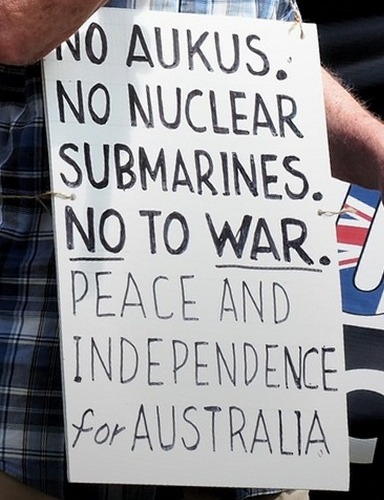 While
France would have provided diesel-electric powered submarines,
Australia has now agreed to acquire nuclear-powered submarines from the
U.S. at a cost of AUD$358 billion, that are harder to detect, have
longer range, faster speed and greater capacity for arms. A statement
by then Prime
Minister Scott Morrison and Defence Minister Peter Dutton in 2021
pointed out the need to "enhance joint capability and interoperability"
and to acquire "the most advanced submarine technology available to
defend
Australia and its national interests." In other words,
the role Australia is
expected to play in supporting U.S. hegemonic aims in the region
requires a more lethal and clandestine type of submarine.
While
France would have provided diesel-electric powered submarines,
Australia has now agreed to acquire nuclear-powered submarines from the
U.S. at a cost of AUD$358 billion, that are harder to detect, have
longer range, faster speed and greater capacity for arms. A statement
by then Prime
Minister Scott Morrison and Defence Minister Peter Dutton in 2021
pointed out the need to "enhance joint capability and interoperability"
and to acquire "the most advanced submarine technology available to
defend
Australia and its national interests." In other words,
the role Australia is
expected to play in supporting U.S. hegemonic aims in the region
requires a more lethal and clandestine type of submarine.
The AUKUS countries say that "Australia's modernization of its submarine fleet" will take several decades, beginning with the purchase of vessels built in the U.S. and then working with the UK to develop and build a new AUKUS-class of nuclear submarines.
Since AUKUS came into being, the Australian people have made clear that they do not accept that the government can dedicate hundreds of billions of dollars to arms producers for weapons to prepare for confrontation with China, at the expense of the people's security and well-being. Protests have been ongoing since AUKUS was founded, most recently on March 14, the day after the latest announcement.
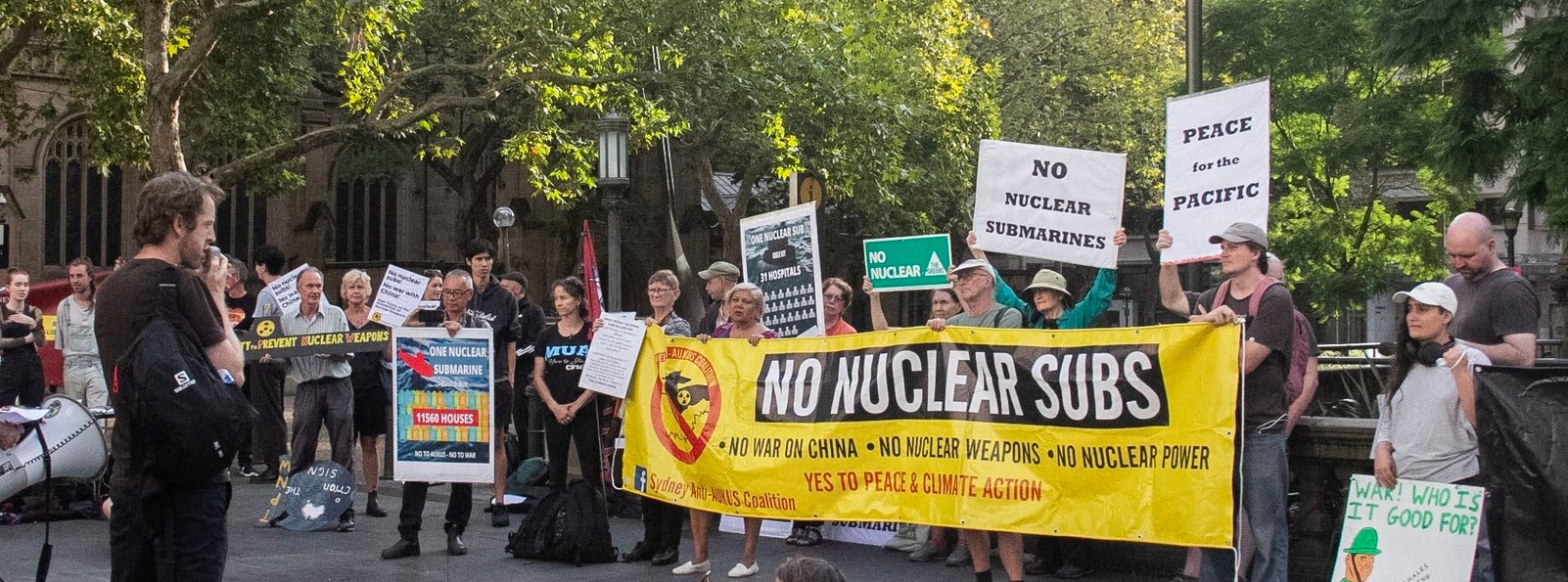


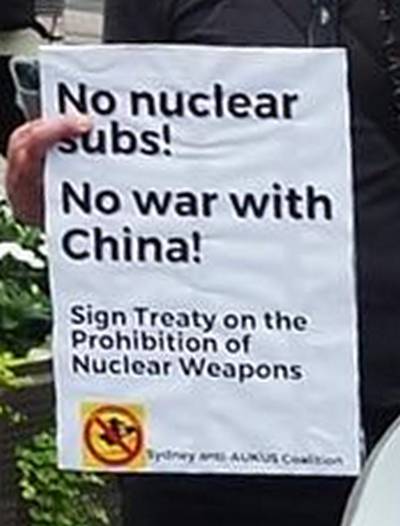
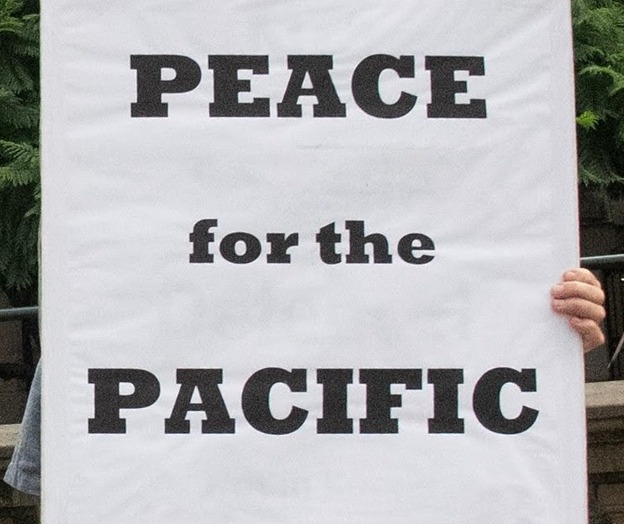
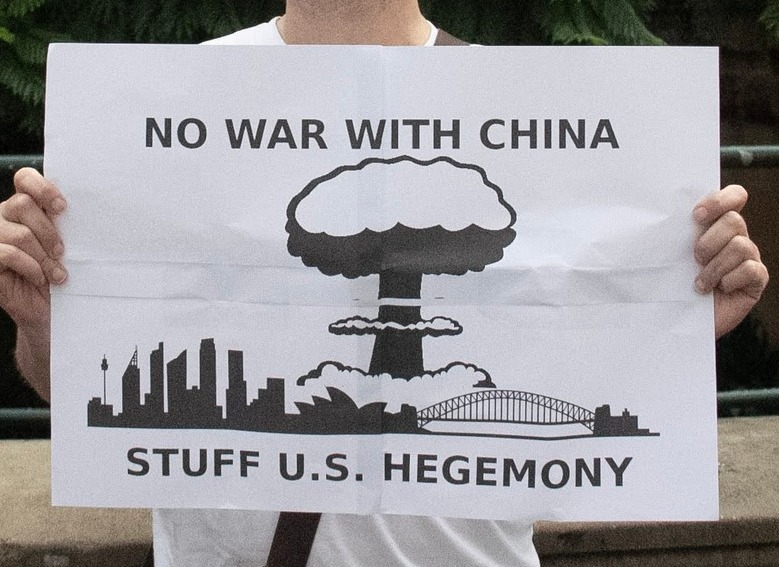


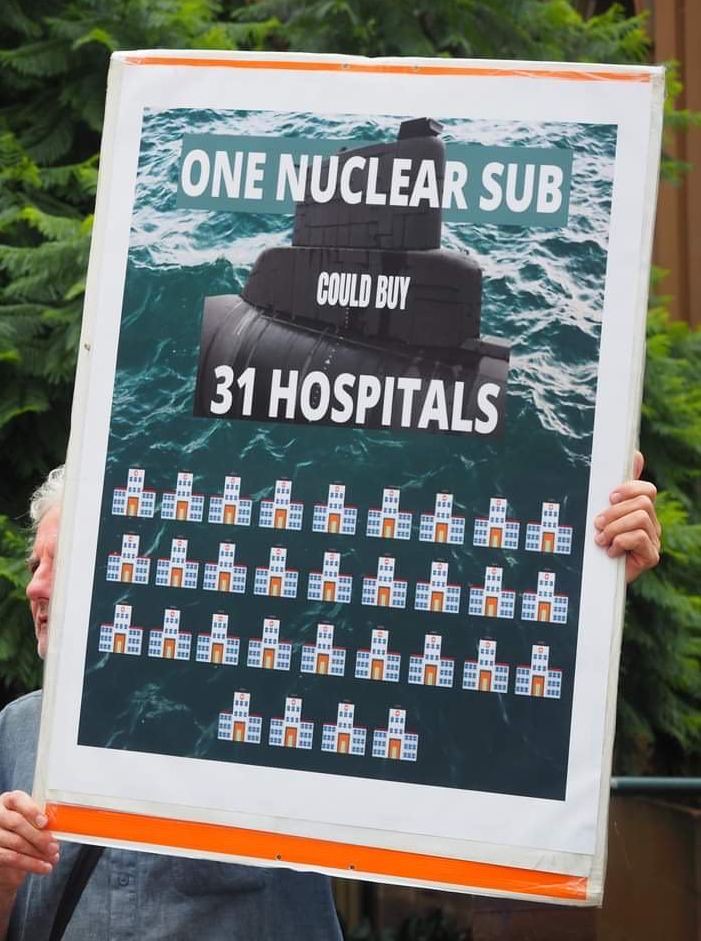
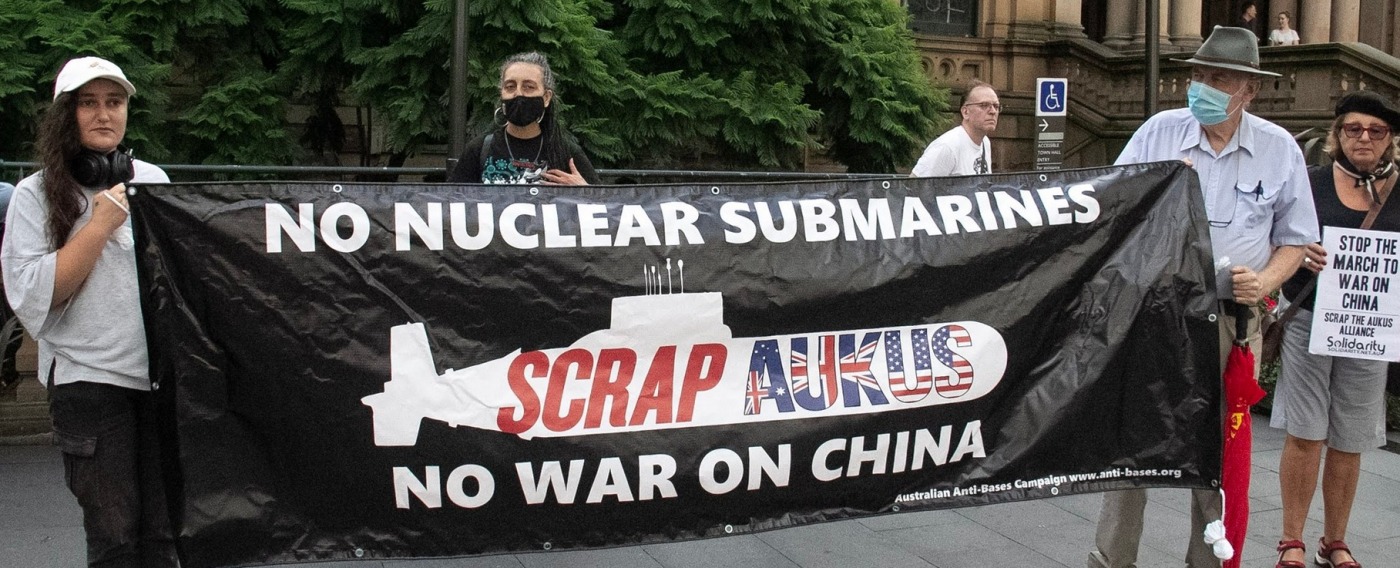
Sydney, March 14, 2023
Former Australian Prime Minister Denounces AUKUS
Former Australian Prime Minister Paul Keating, on March 15 at the National Press Club, issued a scathing denunciation of AUKUS and the servility to the U.S. and UK of the Labor Party government of Anthony Albanese, decrying as well disinformation aimed at creating hysteria about China.
Among other things, Keating stated, "The Albanese government's complicity in joining with Britain and the United States in a tripartite build of a nuclear submarine for Australia under the AUKUS arrangements represents the worst international decision by an Australian Labor government since the former Labor leader, Billy Hughes, sought to introduce conscription to augment Australian forces in World War One."
He stated the Australian government's use of the word sovereignty in these matters rings hollow, and that under AUKUS, Australia will foot the entire bill while the submarines "will forever remain within the operational remit of the United States or now, of Britain -- with technology owned and dependent on U.S. management -- in fact, buying a fleet of nuclear submarines which will forever be an adjunct to the Navy of the United States -- whether commanded by an Australian national or not."
Keating described Australia's reliance on Britain and British Prime Minister Rishi Sunak for its defence as "deeply pathetic," adding that the UK is "looking around for suckers" to create "global Britain [...] after that fool [Boris] Johnson destroyed their place in Europe."
"We're returning [to] Rishi Sunak, for God's sake -- Rishi Sunak -- for Australia to find our security in Asia. I mean, how deeply pathetic is that," he said, later elaborating the various ways in which he said the UK has abandoned military and economic relations with Australia over many decades.
As for the effectiveness of the subs, in Keating's pragmatic estimation, "No Australian nuclear submarine could have more than a token military impact against China, using as is planned, conventional weaponry." Thus "a plan to spend around $368 billion, for nuclear submarines to conduct operations against China in the most risky of conditions, is of little military benefit to anybody, even to the Americans."
As concerns China, he unequivocally stated that it poses a threat to neither the U.S. nor Australia.
"China does not present and cannot present as an orthodox threat to the United States. By orthodox, I mean an invasive threat," Keating said, adding:
"The United States is protected by two vast oceans, with friendly neighbours north and south, in Canada and Mexico. And the United States possesses the greatest arsenal in all human history. There is no way the Chinese have ever intended to attack the United States and it is not capable of doing so even had it contemplated it. So, why does the United States and its Congress insist that China is a 'threat'?
"The U.S. Defense Department's own annual report to Congress in late 2022 said 'the PRC aims to restrict the United States from having a presence on China's periphery.' In other words, China aims to keep U.S. navy ships off its coast. Shocking.
"Imagine how the U.S. would react if China's blue water navy did its sightseeing off the coast of California. The U.S. would be in a state of apoplexy."
Through AUKUS, "[Australia is] now part of a containment policy against China," he said. "The Chinese government doesn't want to attack anybody. They don't want to attack us [...] We supply their iron ore which keeps their industrial base going, and there's nowhere else but us to get it. Why would they attack? They don't want to attack the Americans [...] It's about one matter only: the maintenance of U.S. strategic hegemony in East Asia. This is what this is all about."
Just like in Afghanistan and Iraq, if it all goes wrong, he said, the U.S. "will just pull out and leave the mess behind. They will go back to San Diego, 10,000 km, and leave us with the consequences."
Response from China
On March 14, Wang Wenbin, a spokesperson for the Ministry of Foreign Affairs of the People's Republic of China, responded to a question from AFP about its position on AUKUS. He stated:
"We've repeatedly said that the establishment of the so-called AUKUS security partnership between the U.S., the UK and Australia to promote cooperation on nuclear submarines and other cutting-edge military technologies is a typical Cold War mentality. It will only exacerbate the arms race, undermine the international nuclear non-proliferation regime and hurt regional peace and stability. Peace-loving countries have expressed grave concern and firm opposition. The latest joint statement issued by the U.S., the UK and Australia shows that the three countries, for their own geopolitical interests, have totally disregarded the concerns of the international community and gone further down the wrong and dangerous path.
"Nuclear submarine cooperation between the U.S., the UK and Australia involves the transfer of large amounts of weapons-grade highly enriched uranium from nuclear weapon states to a non-nuclear weapon state, which poses a serious nuclear proliferation risk and violates the purpose and object of the NPT [Non-Proliferation Treaty]. The U.S., the UK and Australia said they are committed to set the highest nuclear non-proliferation standard, this is nothing but high-sounding rhetoric to deceive the world. In essence, it is a move to coerce the IAEA [International Atomic Energy Agency] Secretariat into making a safeguards exemption arrangements, which would seriously undermine the authority of the IAEA. China is firmly opposed to this.
"We need to point out once again that nuclear submarine cooperation bears on the integrity, efficacy and authority of the NPT. The safeguards issues related to AUKUS concern the interests of all member states of the IAEA and should be jointly discussed and decided by all member states through transparent, open and inclusive intergovernmental process. Pending the consensus reached by all IAEA member states, the U.S., the UK and Australia should not proceed with relevant cooperation, and the IAEA Secretariat should not engage with the three countries on the safeguards arrangements for their nuclear submarine cooperation.
"It should be stressed that the Asia-Pacific is the most dynamic and fastest growing region in the world. This doesn't come easily. China urges the three countries to heed the call of the international community and regional countries, discard the outdated Cold War zero-sum mentality and narrow geopolitical mindset, earnestly fulfill their international obligations and refrain from doing anything that undermines regional and world peace and stability."
(With files from U.S. State Department, Australian Government, Consortium News, PRC Foreign Ministry. Photos: Sydney Anti-AUKUS Coalition.)
Filipinos Stand Firm Against U.S. Military Expansion and Provocations
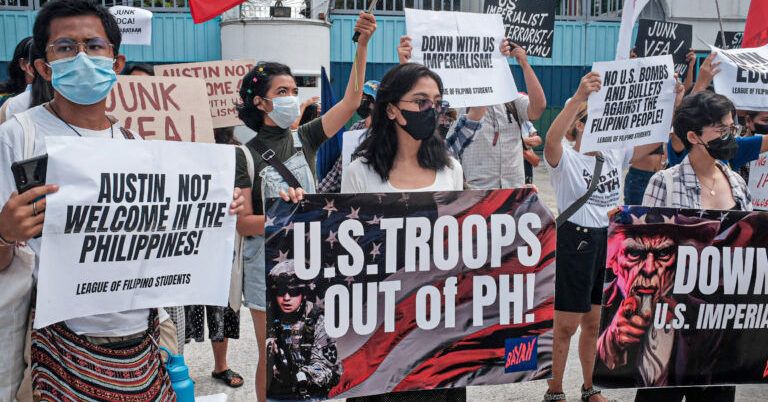
The Filipino anti-war movement vigorously denounced the visit of U.S. Secretary of Defense Lloyd Austin to Manila on February 2. Austin was on an official visit to Asia to gain military concessions from both the Philippines and south Korea. The protesters in Manila shouted slogans, burnt U.S. flags and held up placards denouncing Austin's visit and the decision made by the Ferdinand Marcos Jr. government that day to provide the U.S. with access to four more military bases, adding to the five previously granted under the Enhanced Defence Cooperation Agreement (EDCA). The EDCA was imposed on the Philippines in 2014 as part of the Obama administration's "Pivot to Asia" geopolitical strategy. The EDCA allows U.S. military forces, along with their weapons and supplies, to stay "indefinitely," rotating through barracks and buildings constructed within Philippine military camps.
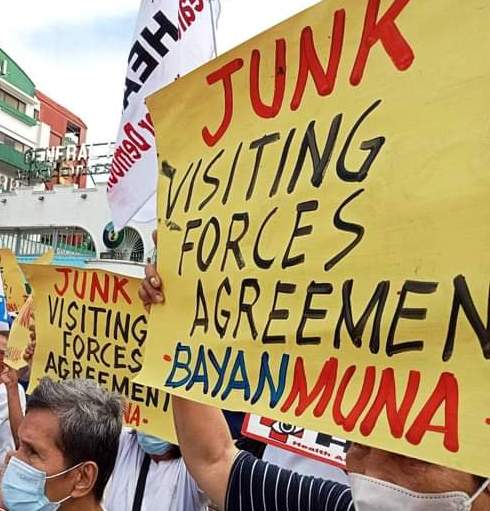 The
protesters demanded that the U.S. military withdraw from the
Philippines. They called for the EDCA to be scrapped along with the
1951 U.S.-Philippine Mutual Defense Treaty and the 1999 Visiting Forces
Agreement, and for the closing of all U.S. military operations in the
Philippines.
The
protesters demanded that the U.S. military withdraw from the
Philippines. They called for the EDCA to be scrapped along with the
1951 U.S.-Philippine Mutual Defense Treaty and the 1999 Visiting Forces
Agreement, and for the closing of all U.S. military operations in the
Philippines.
These unequal treaties enable the U.S. to impose its military dictate on the people of the Philippines, meddle in the internal affairs of the country and integrate it into the U.S. war machine. The increased U.S. military presence in the Philippines falls within the plans of the Biden administration's "Indo-Pacific Strategy" which alleges Chinese "aggression" as the rationale for U.S. military expansion and war preparations in the region.
In his meeting with Secretary Austin, President Marcos said, among other things: "I have always said that it seems to me that the future of the Philippines and for that matter the Asia-Pacific will always have to involve the United States simply because those partnerships are so strong."
The four additional Philippines military bases the U.S. gained access to include one in Cagayan province near the northern tip of Luzon Island, across the sea from Taiwan, the Taiwan Strait and southern China. Another is in Palawan near the Spratly Islands which are being claimed by China, the Philippines, Malaysia, Brunei and Vietnam.
In a statement on February 5, the Communist Party of the Philippines (CPP) denounced this latest military agreement between the U.S. and the Philippines. It noted: "Heightened U.S. presence in the Philippines combines with increased U.S. military presence and activity in Japan, South Korea, naval exercises and manoeuvres in the South China Sea, Sea of Japan, Taiwan Strait and East Philippine Sea." The CPP also noted that the increased U.S. presence in the region, that allows around 8,000 U.S. troops to land on Philippine soil and for some 500 joint war exercises planned for this year, is a provocation and insult to the people of the Philippines who want a peaceful country and Indo-Pacific region.
The CPP called on all the Filipino people to step up their opposition to the further U.S. militarization of their country and region and not permit such trampling of their sovereignty. It emphasized that the increased presence of the U.S. military in the Philippines contributes to further tension and insecurity for all. If unchecked it will lead to a major confrontation between the U.S. and China at the expense of the peoples of the region.
In another statement on March 16, the CPP called on the Filipino people to resolutely oppose the upcoming annual Balaikatan U.S.-Philippine joint military exercises which will deploy at least 12,000 U.S. troops in full-scale joint exercises carried out under the pretext of defending the Philippines. It called on the Filipino people to "continue to link up with other peoples of Asia and other parts of the globe who are resisting imperialist military intervention in their countries. A united front to fight imperialist wars must be established and strengthened and stop these from erupting into a conflagration."
(With files from CPP, Bayan.)
New People's Army Marks 54th Anniversary

March 29, 2023, marks the 54 years since the founding of the New People's Army (NPA), the armed wing of the Communist Party of the Philippines (CPP). The NPA was founded by Jose Maria Sison on March 29, 1969, three months after he led the founding of the CPP. Jose Maria Sison, who passed away December 16, 2022, will always be remembered for founding the CPP and the NPA as the decisive factors to lead the people of the Philippines to affirm their claims and birthright to the land on which they are born and depend upon.
The Filipino people are engaged in a month of celebrations to mark the historic founding of the NPA. In a March 1 statement, the CPP wrote, "The NPA has in its ranks Red fighters who are highly disciplined and politically conscious. They are not just warriors. They are also doctors, teachers, artists, and forces of production who all serve the interests of the masses. Economic, political and military democracy firmly unite its officers and fighters. Veterans or new fighters, regardless of gender or class origin, all are valiantly fighting for the country's freedom. They are wholeheartedly ready to make all sacrifices to serve the masses and achieve victory."
Under the current U.S.-sponsored administration of Ferdinand Marcos Jr., the Philippine state is intensifying the abuse and exploitation of the people and resources of the Philippines by opening more of the national economy to U.S. and other private monopolies. Within this, Canada is also playing a negative role by encouraging private mining companies based in Canada to forcefully displace Indigenous Peoples in the Philippines from their lands in order to steal the mineral resources found there. Canada's immigration and refugee system also enables human trafficking which brings Filipino workers to Canada as cheap and disposable labour to be exploited and abused.
In 2018, then-Philippine President Rodrigo Duterte hatched the so-called National Task Force to End Local Communist Armed Conflict to try and crush the movement for national liberation in the Philippines. Under this "counter-insurgency" program, thousands of innocent people have been "red-tagged" targeted as communist sympathizers and NPA guerrillas and arrested, killed or disappeared. This campaign has become more intense in the context of the U.S. Indo-Pacific strategy, by which the U.S. is further militarizing the Philippines to use as a forward base to contain and threaten China and assert is hegemony over the Indo-Pacific region.
The anti-communist terror and violence of the Philippine state and its U.S. sponsors have had the effect of swelling the ranks of the NPA as more and more youth come forward to join the armed struggle. The NPA is active in more than 110 guerrilla fronts which is expanding despite immense difficulties. In marking the 54th anniversary of the founding of the NPA, the CPP notes that it is not the superior weapons or numbers of the U.S.-backed and financed Armed Forces of the Philippines, or the Philippines Constabulary with their tanks and bombs and planes and guns that are decisive in the battle, but rather the support of and just cause of the Filipino people.
The CPP statement calls on the NPA to commemorate its 54th anniversary by stepping up its resolve, to widen and deepen the guerrilla war by strengthening its links with the people and to march from strength to strength to victory and a bright, prosperous and democratic future for the Filipino people.
On the occasion of the 54th anniversary of the founding of the NPA the, TML calls on the Canadian people to stand as one with the fraternal peoples of the Philippines in their revolutionary drive to liberate their homeland from the clutches of U.S. imperialism and local ruling circles, a fight which the CPP and NPA are leading.
(With files from CPP, NPA.)
Second U.S. Summit for Democracy
An Even Paltrier Version of the First
On March 29, U.S. President Joe Biden and the leaders of Canada, Costa Rica, the Netherlands, the Republic of Korea and the Republic of Zambia opened the second Summit for Democracy in Washington, DC. The first was held in December 2021. According to Biden, the intent of the Summit was to gather leaders from around the world "to spur further action to strengthen democratic resilience, demonstrate how democracies are delivering for citizens, and highlight how democracies are best equipped to address the world's most pressing challenges."
The U.S. is said to have invited 120 leaders to the Summit which met mostly virtually and managed to muster 65 "governments and authorities from Africa, Asia, Europe, North America, and South America to develop an intergovernmental coordination body." Biden announced an additional $690 million in funding on top of the $400 million announced at the last summit for his "initiative for democratic renewal." Biden pledged that "over the course of three years, my administration intends to work with Congress to commit $9.5 billion across all our efforts to advance democracy around the world."
The poster boy for democracy was Volodymyr Zelensky, President of Ukraine which is mired in corruption and so undemocratic it does not even pass muster to qualify for membership in the European Union. He gave the keynote address March 29. He spoke in an irrational manner, saying, "Democracy must be able to act -- and act in advance. Democracy must learn to be uncompromising in the face of evil. The spirit of democracy is to find a compromise, but this only works for internal freedom in a given country. We should get rid of the illusion that compromising with evil can give something to freedom. The enemies of democracy must lose, and only this can be the basis of true security for democracy." He ranted and raved against Russia saying "...what is the strategy of the free world in relation to totalitarian Russia ... evil must lose the war.. First. We should not think how to save Putin's face in order to allegedly reduce the cost of fighting him. We should think how to preserve respect for democracy in those countries where freedom has yet to win... Second ... the defence of democracy must have all the weapons that will reliably guarantee the defeat of the aggressor. Third. Russians must contribute to protecting the world from the Kremlin, whose impunity they have tolerated. It is necessary to look for, freeze and direct for recovery not only individual assets of the aggressor state and individual related parties, but all assets of Russia and Russian wealthy who have traded silence for increasing their wealth. They must have a motive to act in defence of freedom, and to bring an end to this aggression and the Kremlin's terrorist rule. ...Democracy needs a victory. Now! This year! Not some other time. Not over time. Now!"
President Yoon Suk-yeol from south Korea co-hosted the Summit and together with Biden issued a vacuous joint statement. It claimed that since 2021, "the Summit for Democracy process has brought together hundreds of leaders from governments, civil society, and the private sector committed to strengthening democratic governance, protecting human rights, and advancing the fight against corruption. Participating governments have made hundreds of commitments to reform laws and policies, bolster transparent and accountable institutions, and contribute additional support to democratic reformers, journalists, and activists. Non-governmental organizations have used the Summit for Democracy platform to expand their own vital work of protecting the most vulnerable and holding their leaders to account. Corporations have taken action to improve democratic resilience through their business practices and engagement with workers, communities, and other stakeholders."
This shows that the Summit is merely an instrument of the Biden administration to get the U.S. recognized as undisputed leaders on matters of democracy and human rights, the state of affairs in the United States and its crimes at home and abroad notwithstanding. Global Times pointed out that the Biden administration's "ambition to pull more countries into its interest camp to contain its rivals, especially China and Russia, has been interwoven into the agenda of the event and is too obvious to hide."
Canada's Contribution to Bogus Summit
On March 29, Prime Minister Justin Trudeau and various members of his cabinet participated in the second U.S. Summit for Democracy. Trudeau spoke in a "leader-level plenary on Democracy Delivering Inclusion and Equality." A news release from the Prime Minister's Office informs that at the Summit, Trudeau "reaffirmed Canada's commitment to democracy, human rights and the rule of law [and] announced over $50 million in funding support of initiatives that promote and protect democracy at home and abroad."
The funding includes a $2 million grant to increase Canadian support for the U.S. Department of State's "Emergency Assistance and Capacity Building Programs," $3 million having been contributed at the 2022 Summit for Democracy.
Funding for the National Endowment for Democracy
Such funding for interference in the affairs of other countries to advance U.S.-led interests is not new. Both the Trudeau Liberals and the Harper Conservatives before them have provided many grants to the International Republican Institute which describes itself as "one of the core institutes of the National Endowment for Democracy (NED), with a mission to advance democracy worldwide." As of March 21, public listings of government grants and contributions show that under the Harper and Trudeau regimes, Global Affairs has provided the International Republican Institute just under $18 million.
Among the most recent projects of the International Republican Institute is the one announced on March 23. The Institute's "Center for Insights in Survey Research" conducted a poll in Argentina, the Dominican Republic, El Salvador and Panama, described as "countries that have seen large financial investments from Beijing." The poll was to determine the "knowledge and perception" of the people in these countries about "Chinese Communist Party (CCP) influence." It concluded that the survey results provided "the knowledge-gaps and opportunities for resilience against the authoritarian influence of the CCP in Latin America and the Caribbean (LAC)." Referring to the People's Republic of China as the Chinese Communist Party has become the agreed upon terminology of the Five Eyes police agents. In no other case are the activities of a government referred to as the activities of the political party leading the government.
The survey laments that even though China has been expanding its influence in Latin America and the Caribbean, such as the China Development Bank and China Export-Import Bank providing more than $138 billion in loan commitments since 2005, "people were generally unaware of the financial activities of the Chinese government." It reports, for instance, that "this was highest in Panama, where 62 per cent did not know of any major Chinese investment."
The Institute sees this as a problem because "without this knowledge, [of China's involvement in their countries] the public is unable to put pressure on their government against unfavorable investments and loans." "As governments in LAC become increasingly tied to the CCP, it is essential to assess public understanding and opinion on the CCP involvement in their country," it concludes, thereby providing other wings of these police agencies direction for their work.
The Liberal government's increased funding for Canada's involvement in the multi-faceted campaign of the U.S.-led NATO and member countries' policing agencies and its attempt to justify it in the name of high ideals shows that in today's deteriorated and expiring liberal-democratic institutions, hypocrisy and shamelessness on the part of its ruling elites have no bounds.
Against the backdrop of the escalating hysteria about Chinese interference in Canada based on police leaks to media, the Canadian government of police powers is pursuing a strategy of creating tension and fear about foreign agents who are allegedly aiming to undermine the country's political and electoral systems. While doing this they are extending their overt and covert interference in the internal affairs of the countries they have declared are "hostile" and not part of the "like-minded" nations of the world and persisting in their relentless anti-social offensive against their own people.
International Meetings and Fora
China/Arab Summits

The China/Arab Summits in December indicate how the world is moving forward. The focal point for the world's peoples is slowly shifting from the imperialist centres in North America and Europe with their legacy of slavery, oppression, war and destruction, to populated and rapidly developing regions in Asia, Africa, Latin America and the Caribbean.
The speeches and documents from the December Summits reveal a great yearning for change to peaceful development for the mutual benefit of all away from the hegemony, interference and endless wars of U.S. imperialism and other colonial regimes. A central theme is for people to govern their own affairs without big powers breathing down their necks and screaming at them what their values and thinking should be and what they should be doing.
The long dreadful era of colonial pillage and white man's burden to expand, pillage and control the world at the point of a gun is waning. The Russian working class and peasantry and others stood up in 1917; the world's peoples stood up to defeat fascism in World War II; the Chinese people stood up in 1949 to drive out the colonial marauders and their vassals; and now, despite setbacks along the way, the peoples are renewing their advance and affirming their determination to find a way forward and control their own affairs.
The advance of civilization is seen most clearly in the progress of the productive forces. Modern industrial mass production is unstoppable with only the relations of production lagging behind and obstructing the new from coming into being and playing its full positive role. Despite the roadblocks from the imperialist status quo, the peoples of the world will invent new and imaginative forms of governing and conducting their relations in conformity with the advanced way of life and modern means of production.
The objective conditions demand new forms for relations and ways of governing, and human beings have always proved capable of finding them when required and coming to terms and settling accounts with the decaying conscience of the old that has seen its day and is exhausted. The December Summits reveal another world is possible despite its warts and not being all we want it to be. They show that the future belongs to the people and is there in front of them to grasp, shape and build the New.
China-Arab States Summit and the China-Gulf Cooperation Council Summit
The first China-Arab States Summit and China-Gulf Cooperation Council (GCC) Summit took place December 7-10. Chinese President Xi Jinping and 21 leaders of Arab states attended the China-Arab States Summit. All leaders of the GCC member states attended the China-GCC Summit meeting with President Xi who in addition paid an official state visit to Saudi Arabia.[1, 2]
China-Arab States Summit
At the China-Arab States Summit, President Xi Jinping put forward cooperation initiatives that China is ready to advance in food security, public health, green innovation, energy security, inter-civilizational dialogue, youth development, and security and stability.
The two sides issued the Riyadh Declaration of the First China-Arab States Summit, the Outline of the Comprehensive Cooperation Plan Between the People's Republic of China and Arab States and a document on Deepening the Sino-Arab Strategic Partnership for Peace and Development, and agreed to build a China-Arab community with a shared future in the new era. See Riyadh Declaration here.
President Xi Jinping delivered a speech at the Summit where he stressed that China and Arab states enjoy a long history of friendly exchanges. The two sides have come to know and befriend each other through the ancient Silk Road, shared weal and woe in their respective struggles for national liberation, conducted win-win cooperation in the tide of economic globalization, and upheld fairness and justice in the changing international environment. Together, China and Arab states have nurtured the spirit of friendship featuring "solidarity and mutual assistance, equality and mutual benefit, and inclusiveness and mutual learning."
Solidarity and mutual assistance is a distinct feature of China-Arab friendship, President Xi said. Equality and mutual benefit is a constant driver for their friendship. China and Arab states have set an example for South-South cooperation in pursuing mutually beneficial collaboration. Inclusiveness and mutual learning is a key value inherent in their friendship. China and Arab states appreciate and learn from each other. The two sides advocate together inter-civilizational dialogue and endeavour to safeguard the diversity of world civilizations.
President Xi underscored that the world today is in a new period of turbulence and transformation. West Asia and north Africa are undergoing new and profound changes. The aspiration of the Arab people for peace and development is much more compelling, and their call for equity and justice is stronger than ever. As strategic partners, he said, China and Arab states should carry forward the spirit of China-Arab friendship, strengthen solidarity and cooperation, and foster a closer China-Arab community with a shared future, so as to deliver greater benefits to the peoples and advance the cause of human progress.
President Xi said China and Arab states should stay independent and defend their common interests. China supports Arab states in independently exploring development paths suited to their national conditions and holding their future firmly in their own hands. China is ready to deepen strategic mutual trust with Arab states, and firmly support each other in safeguarding sovereignty, territorial integrity and national dignity. The two sides should jointly uphold the principle of non-interference in other countries' internal affairs, practice true multilateralism, and defend the legitimate rights and interests of developing countries.
China and Arab states should focus on economic development and promote win-win cooperation, Xi stressed. The two sides should strengthen synergy between their development strategies, and promote high-quality Belt and Road cooperation. They should consolidate cooperation in traditional areas including economy and trade, energy and infrastructure development. In the meantime, the two sides should strengthen new sources of growth such as green and low-carbon development, health and medical services, and investment and finance, and expand new frontiers including aviation and aerospace, digital economy and peaceful use of nuclear energy. China and Arab states should also tackle major challenges like food security and energy security. China will work with the Arab side to implement the Global Development Initiative and drive sustainable development of South-South cooperation.
China and Arab states should uphold regional peace and strive for common security, Xi continued. China supports the Arab side in promoting political settlement of hotspots and challenging issues with Arab wisdom, and build a common, comprehensive, cooperative and sustainable security architecture in the Middle East. China urges the international community to respect the role of the Middle East people as masters of their own affairs, and add positive energy to the security and stability of the region. China welcomes the Arab side to participate in the Global Security Initiative, and will continue to contribute Chinese wisdom to promoting peace and tranquility in the Middle East.[3]
Xi proposed that China and Arab states should increase exchanges among civilizations to enhance mutual understanding and trust. The two sides need to increase personnel exchange, deepen people-to-people cooperation, and promote the exchange of governance experience. The two sides need to jointly oppose Islamophobia, carry out cooperation on deradicalization, and reject association of terrorism with any particular ethnic group or religion. China and Arab states need to advocate humanity's common values of peace, development, equity, justice, democracy and freedom, and set an example of inter-civilizational exchanges and mutual learning in the new era.
President Xi stressed that the Palestinian issue bears on peace and stability in the Middle East. The historical injustices done to the Palestinian people should not be left unattended indefinitely. The legitimate rights and interests of a nation are not up for trade, and the demand to establish an independent state shall not be denied. The international community should stay firm in its commitment to the two-state solution and strive for a just settlement of the Palestinian issue at an early date. China will continue to provide humanitarian assistance to Palestine and support livelihood projects in the country.
In conclusion, President Xi reiterated that the 20th National Congress of the Communist Party of China laid out the tasks and path of advancing the rejuvenation of the Chinese nation on all fronts through Chinese modernization. China will stay committed to upholding world peace, promoting common development, and building a community with a shared future for humankind. By doing so, China wishes to create new opportunities for Arab states and all other countries with China's new development.
Arab leaders at the Summit echoed President Xi's speech and the eight major cooperation initiatives he proposed. They noted that the friendly relations between Arab states and China are built on the basis of mutual respect, cooperation as equals and mutual benefit. The Arab side said its members attach high importance to China's great development achievements and important role in the world. They highly commend China for putting forth the Belt and Road Initiative, the Global Development Initiative and the Global Security Initiative. They also highly recognize China's important propositions for facilitating political settlement of regional hotspot issues, its consistent support for the legitimate rights and interests of the Palestinian people, and its commitment to upholding justice in the international community. In a world in danger of division and confrontation and still haunted by unilateralism and hegemony, deepening Arab-China strategic partnership would help bring about equity and justice and uphold world peace, prosperity and development.
Through this Summit, the Arab side said it hopes to further cement the friendship and mutual trust between Arab States and China, make comprehensive plans for and strengthen mutually beneficial cooperation across the board, build an Arab-China community with a shared future in the new era and bring the Arab-China comprehensive strategic partnership to a new and higher level, so as to better serve the common interests of Arab states and China, and realize the shared aspirations of the Arab and Chinese people.
The Arab side said it upholds independence and autonomy, and is firmly committed to the one-China principle. It will continue to firmly support China on issues concerning China's core interests and oppose any hostile actions targeted against China. The Arab side hopes to work with China to deliver on the outcomes of this Summit, advance the eight major cooperation initiatives, continue to promote Belt and Road cooperation, step up communication and coordination on international and regional affairs, respond to climate change, food security, energy security and other common challenges through cooperation, step up people-to-people exchanges, enhance inter-civilizational dialogue and make positive contribution to peace and common development of all humanity.
President Xi had bilateral meetings with 20 Arab leaders respectively to renew their friendship, explore cooperation and confer about world affairs. Relevant Chinese authorities and the Arab side, the General Secretariat of the Arab League and the affiliated bodies of the Gulf Cooperation Council reached and signed a number of cooperation documents on Belt and Road cooperation, energy, food, investment, green development, security, aerospace and other fields.
China-GCC Summit
At the China-GCC Summit, President Xi Jinping stressed in his speech that China and GCC countries should be partners for greater solidarity, common development, common security and cultural prosperity.
The two sides issued a joint statement by the People's Republic of China and the Cooperation Council for the Arab States of the Gulf and a 2023-2027 action plan for strategic dialogue and partnership. See statement here.
In a speech at the China-GCC Summit Xi said: "China has a vast consumer market and a complete industrial system, while the GCC, with rich energy and resources, is embracing diversified economic development. This makes the two sides natural partners of cooperation."
President Xi's State Visit to Saudi Arabia
During President Xi Jinping's visit to Saudi Arabia the two sides agreed to take turns to host biennial meetings between the heads of state of the two countries, upgrade the China-Saudi Arabia High-level Joint Committee to the prime minister's level, synergize China's Belt and Road Initiative and Saudi Arabia's Vision 2030, and continue to strengthen Chinese language and Arabic teaching in the two countries.
Energy Cooperation Between China and Saudi Arabia
During President Xi Jinping's visit to Saudi Arabia on December 9, the two sides signed over 20 business agreements worth 110 billion riyal ($29 billion) covering energy, security and investments.
"Saudi Arabia and China endeavour to enhance cooperation in the energy sector supply chains, by establishing a regional centre for Chinese factories in the kingdom by taking advantage of the kingdom's distinguished location among the three continents of Asia, Africa and Europe," the Saudi Energy Minister said in a statement.
According to Chinese customs data, Saudi Arabia was China's top oil supplier in the first ten months of 2022, making up 18 per cent of China's total crude oil purchases, with imports totalling 73.54 million tons, or 1.77 million barrels per day.
China is the kingdom's largest trading partner, with mutual trade worth $87.3 billion in 2021. Chinese exports to Saudi Arabia reportedly reached $30.3 billion, while China's imports from the kingdom amounted to $57 billion.
In a joint statement the two countries expressed satisfaction with the signing of the implementation plan for synergizing the Belt and Road Initiative and Saudi Arabia's Vision 2030, and agreed to accelerate the synergy of the two countries' projects.
This deep synergy will bring advanced science, technology and ideas to the country, and boost its economic and social development, said Saudi Minister of Industry and Mineral Resources Bandar bin Ibrahim Alkhorayef.
Highlighting the complementarities between the two countries in the fields of economy and trade, the Saudi minister said that while China stands at the forefront of world innovation and high-tech development, Saudi Arabia is endowed with abundant mineral resources. He expressed confidence in the broad prospects of bilateral cooperation, saying that besides the energy and mining industries, Saudi Arabia also boasts a unique geographical location and a complete infrastructure with thriving start-up businesses, which can make it an important hub for China's investment and trade in the Middle East and North Africa.
Notes
1. In attendance at the China-Arab Summit along with President Xi were leaders from 21 countries of the Arab League, including:
Crown Prince and Prime Minister Mohammed bin
Salman Al Saud of Saudi Arabia,
President Abdel Fattah Al-Sisi
of Egypt,
King Abdullah II bin Al-Hussein of Jordan,
King
Hamad bin Isa bin Salman Al Khalif of Bahrain,
Crown Prince
Mishal Al-Ahmad Al-Jaber Al-Sabah of Kuwait,
President Kais
Saied of Tunisia,
President Ismail Omar Guelleh of Djibouti,
President
Mahmoud Abbas of Palestine,
Emir Sheikh Tamim bin Hamad Al
Thani of Qatar,
President Azali Assoumani of Comoros,
President
Mohamed Ould Ghazouani of Mauritania,
Prime Minister Mohammed
Shia' Al Sudani of Iraq,
Prime Minister Aziz Akhannouch of
Morocco,
Prime Minister Aοmene Benabderrahmane of
Algeria, and
Prime Minister Najib Mikati of Lebanon,
as
well as Secretary-General Ahmed Aboul Gheit of the Arab League and
heads of other international organizations.
2. The Cooperation Council for the Arab States of the Gulf, also known as the Gulf Cooperation Council, is a regional, intergovernmental, political, and economic union comprising Bahrain, Kuwait, Oman, Qatar, Saudi Arabia, and the United Arab Emirates.
3. Global Security Initiative is an initiative of China to "uphold the principle of indivisible security, build a balanced, effective and sustainable security architecture, and oppose the building of national security on the basis of insecurity in other countries."
Joint Statement Between China and Russia
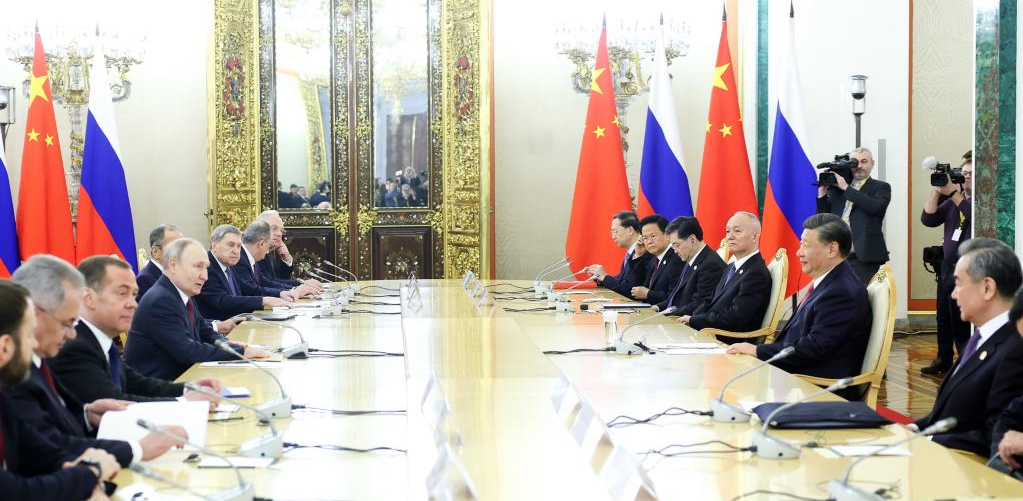
Chinese President Xi Jinping and Russian President Vladimir Putin, on March 21 at the Kremlin in Moscow, signed and released a Joint Statement of the People's Republic of China and the Russian Federation on Deepening the Comprehensive Strategic Partnership of Coordination for the New Era.
In the statement, the two sides pointed out that China-Russia relations are not a military-political alliance of the kind during the Cold War. They transcend such a model of state-to-state relations and have the nature of no-alliance, no-confrontation and of not targeting any third party.
They said different countries have different histories, cultures and national conditions, and they all have the right to choose their own development path. There is no such thing as a superior "democracy." Russia said it highly regards the Global Civilization Initiative proposed by China and also spoke highly of China's Global Development Initiative (GDI) and said it will continue to participate in the work of the GDI's Group of Friends.
Russia, in the statement, reaffirms its adherence to the one-China principle, recognizes Taiwan as an inalienable part of Chinese territory, opposes any form of "Taiwan independence," and firmly supports China's measures to safeguard its sovereignty and territorial integrity.
Both sides have agreed to strengthen cooperation in law enforcement such as preventing the "colour revolution," and cracking down on the "three forces" including the "East Turkistan Islamic Movement," transnational organized crime, economic crime and drug crime.
The two, according to the statement, will build a closer partnership for energy cooperation. They will support enterprises of both sides in promoting energy cooperation projects such as oil and gas, coal, electricity and nuclear energy, and promote the implementation of initiatives that will help reduce greenhouse gas emissions, including the use of low-emission and renewable energy.
They will also jointly safeguard international energy security including the security of key cross-border infrastructure, and maintain the stability of industry and supply chains of energy products.
In the statement, the two countries call for an objective, impartial and professional investigation into the explosion of the Nord Stream pipeline, and jointly oppose the attempt to politicize origin tracing of viruses.
China and Russia express serious concerns about the consequences and risks on regional strategic stability of the trilateral security partnership AUKUS, and related nuclear-powered submarine cooperation programs among the United States, Britain and Australia.
The two sides strongly urge AUKUS members to strictly fulfill their non-proliferation obligations of weapons of mass destruction and their means of delivery, and safeguard regional peace, stability and development.
They also express serious concern about Japan's plan to discharge nuclear-contaminated water from the Fukushima nuclear power plant accident into the sea this year, and stress that Japan must conduct transparent and full consultations with neighbouring countries and other stakeholders and relevant international agencies.
The two sides urge Japan to properly handle the nuclear-contaminated water in a scientific, transparent and safe manner, and accept the long-term supervision of the International Atomic Energy Agency and related countries, so as to effectively protect the marine environment and the rights to health of people of all countries.
Both countries express serious concern about the biological military activities of the United States, both inside and outside the country, which seriously threaten other countries and undermine the security of relevant regions. They demand that the United States make clarification on this, and refrain from carrying out biological activities that violate the Biological Weapons Convention.
The two sides urge NATO to abide by its commitments as a regional and defensive organization. They call on NATO to respect the sovereignty, security, interests, diversity of civilizations, history and culture of other countries, and to treat their peaceful development in an objective and fair manner.
They also express serious concern about NATO's continuous strengthening of military security ties with Asian-Pacific countries and undermining of regional peace and stability. The two sides oppose piecing together a closed and exclusive group structure in the region, and divisive politics and confrontation.
China and Russia, said the statement, express concern over the situation on the Korean Peninsula, and urge the U.S. side to respond to the legitimate and reasonable concerns of the Democratic People's Republic of Korea with practical actions and create conditions for the resumption of dialogue.
(Xinhua)
G20 Foreign Ministers' Meeting in New Delhi, India, March 1 and 2
Attempts to Impose Anti-Russia and Anti-China Agenda on International Fora Continue
The Group of 20 (G20), the grouping of the world's largest economies, is being chaired by India in 2023.[1] In preparation for the September heads of state summit in New Delhi, India, various working groups have been holding meetings in India since December 2022, while a G20 Foreign Ministers' Meeting was convened in New Dehli on March 1 and 2.
The G20 brings together the U.S., Canada and EU, as well as Russia and China. Notably, since the U.S. and NATO instigated their proxy war in Ukraine, the U.S. and its allies have sought to use the G20 as a venue to try to isolate Russia and try to impose support for Ukraine on other countries. This was the case at the recent Foreign Ministers' meeting.
The ministerial meeting was opened with a recorded message from Indian Prime Minister Narendra Modi, who called for a "unity of purpose and unity of action" by G20 states to overcome a crisis in post-World War II international architecture. He urged the participants of the summit to overcome their differences toward achieving that goal.
During the meeting, in-depth discussions were carried out on multilateralism, food and energy security, development cooperation, counterterrorism and other agenda items. Concerns were expressed about the current international situation and the need to strengthen multilateralism.
Indian Foreign Minister Subrahmanyam Jaishankar claimed there was "a great deal of agreement on the bulk of issues." However, the most salient feature of the meeting was the failure of the U.S. -- represented by U.S. Secretary of State Antony Blinken -- and its allies to issue any resolutions and condemning Russia for the war in Ukraine, which was a major point of discussion and contention at the meeting, such that a joint communiquι typically issued at the end of the meeting could not be produced, necessitating that the "outcome document" be issued by India as chair instead.
Both Russia and China had strong objections to the two paragraphs of the draft statement borrowed from last year's Bali Summit, which demanded the unconditional withdrawal of all Russian troops from Ukrainian territory.
Russian Foreign Minister Sergey Lavrov stated that the behaviour "of some members of the G20," turned the work on the group's agenda into a circus in their "attempt to blame Moscow for their own mismanagement." News agency reports indicate Lavrov said that "the attacks against Moscow at the G20 look 'particularly wild' coming from nations who 'never complained at [the organization's] meetings over the many hundreds of thousands of victims of Washington's adventures in the Middle East, which were conducted under a pretext of national security' thousands of miles from American soil." Lavrov said: "We need to guard against illegal sanctions, manipulation of markets, arbitrary price caps and other attempts to appropriate other parties' resources." Western policies are "degrading international economic relations, weaponizing them,'" he said adding that Russia was shocked by the "unpunished sabotage" against the Nord Stream pipelines, which happened "in NATO's and the EU's zone of responsibility."
Chinese Foreign Minister Qin Gang told the meeting that, faced with a volatile international situation and rising global challenges, the G20 must rise to the occasion, enhance cooperation, and contribute its share to global development and prosperity. He called on G20 countries to practice true multilateralism and follow the principles of dialogue on an equal footing and consensus-building through consultation, and that no one should engage in power politics or even bloc confrontation. He pointed out the need to promote the sound development of globalization, reject unilateralism, protectionism and attempts to decouple or sever supply chains, and make global development more inclusive, resilient and beneficial for all.
Canada's Foreign Minister Mιlanie Joly attended the meeting, where she also pushed confrontation with Russia and China, in keeping with letting Canada's foreign policy be dictated by U.S. and NATO aims. She said nothing about how the U.S./NATO instigated their proxy war in Ukraine against Russia, while claiming Russia is spreading disinformation, and that "It was important for Canada to be present to counter Russian disinformation." Joly also met for the first time with Chinese Foreign Minister Qin Gang on the sidelines of the ministerial meeting. Joly repeated the grandstanding and undiplomatic tone taken by Prime Minister Trudeau with Chinese President Xi Jinping at last year's G20 Summit in Bali, declaring, "Canada will never tolerate any form of foreign interference in our democracy and internal affairs by China."
In related news, massive demonstrations against the meeting of the G20 Working Group on Education, held in Amritsar from March 15 to 17, were organized by farmers and workers in Punjab. They shouted Down With Imperialism, Down With Land Theft, Down With Stealing Water, Long Live Struggles for Control of Resources. In order to stop people from reaching Amritsar the army was sent out to confine them to the villages. Thousands of people nonetheless reached Amritsar and exposed the hypocrisy of the chief minister. Farmers said that he is wearing his turban in the style and colour of Bhagat Singh but is selling the resources and labour of the people of Punjab. Nothing good for people can come out of meetings of representatives of the financial oligarchies and oligopolies. People shouted slogans for the release of political prisoners, who have been in prison for years even after completing their sentences.
Note
1. As of 2023, there are 20 members in the group: Argentina, Australia, Brazil, Canada, China, France, Germany, India, Indonesia, Italy, Republic of Korea, Japan, Mexico, Russia, Saudi Arabia, South Africa, Turkey, the United Kingdom, the United States, and the European Union. Guest invitees include, amongst others, Spain, the United Nations, the World Bank, the African Union and ASEAN. Within the G20 is the G7: Canada, France, Germany, Italy, Japan, the United Kingdom, and the United States, as well as the European Union.
The G20 was founded in 1999 in response to several world economic crises. Since 2008, it has convened at least once a year, with summits involving each member's head of government or state, finance minister, or foreign minister, and other high-ranking officials; the EU is represented by the European Commission and the European Central Bank. Other countries, international organizations, and nongovernmental organizations are invited to attend the summits, some on a permanent basis.
Wikipedia describes the G20 as "an intergovernmental forum comprising 19 countries and the European Union (EU). It says the G20 works to address major issues related to the global economy, such as international financial stability, climate change mitigation, and sustainable development. It says the G20 "is composed of most of the world's largest economies, including both industrialized and developing nations; it accounts for around 80 per cent of gross world product (GWP), 75 per cent of international trade, two-thirds of the global population, and 60 per cent of the world's land area."
News in Brief
Russia Issues New Detailed Foreign Policy
On March 31, Russian President Vladimir Putin signed a decree approving an updated foreign policy concept. In signing the decree, Putin said: "The concept is legally based on the Russian Constitution, generally recognized principles and norms of international law, as well as Russia's international treaties, federal laws and other normative legal acts that regulate the activities of federal government bodies in the field of foreign policy."
The document sets out Russian policy on developing global trends and issues as well as with regions and countries of the world.
Russian Foreign Minister Sergey Lavrov underscored that the document directly calls the U.S. the main instigator of anti-Russian policies on the world scale.
In the new foreign policy concept, Russia proceeds from the indivisibility of international security (in global and regional aspects) and seeks to ensure it equally for all states on the basis of the principle of reciprocity.
President Putin's decree indicates that Russia plans to pay paramount attention to:
- using peaceful means, primarily diplomacy, negotiations, consultations, mediation and good offices, to resolve international disputes and conflicts on the basis of mutual respect, compromises and a balance of legitimate interests;
- developing comprehensive cooperation in order to neutralize attempts by any states and inter-state associations to achieve global dominance in the military sphere;
- building up political and diplomatic efforts aimed at preventing the use of military force in violation of the UN Charter;
- taking political and diplomatic measures to counter interference in the internal affairs of sovereign states, primarily aimed at complicating the domestic political situation, unconstitutional change of power or violation of the territorial integrity of states;
- ensuring strategic stability and removing preconditions for unleashing a global war, and the risks of using nuclear and other types of weapons of mass destruction; creating a renewed international security architecture, preventing and resolving international and internal armed conflicts, countering transnational challenges and threats in certain areas of international security.
(News agencies)
Recent Moves Away from U.S. Dollar Dominance
China and Brazil, on March 29, reached a deal to trade in their currencies without the use of the U.S. dollar as an intermediary. China is Brazil's biggest trading partner, recording a record $150.5 billion in bilateral trade in 2022.
In Southeast Asia, finance ministers of the Association of Southeast Asian Nations (ASEAN), in a joint April 1 press release, announced their decision to reinforce financial resilience through the use of local currency to support cross-border trade and investment in the ASEAN region, moving away from the U.S. dollar, euro, Japanese yen and British Pound.
India's central government unveiled its new Foreign Trade Policy on March 31, which is expected to facilitate greater trade, boost manufacturing, help to shift away from the U.S. dollar, and make the rupee a global currency.
In Russia, Deputy Chairman Alexander Babakov of the Duma informed on March 30 that the BRICS bloc of emerging economies -- Brazil, Russia, India, China, and South Africa -- is working on developing a "new currency" that will be presented at the organization's upcoming summit in Durban in August.
(News agencies)
French President Macron and President of European Union Visit China
From April 5-7, French President Emmanuel Macron, accompanied by European Union Commissioner Ursula von der Leyen, will be on an official state visit to China. Macron will meet with Chinese President Xi as well as Premier Li Qiang and top legislator Zhao Leji. He will also visit Guangzhou in South China's Guangdong Province, Chinese Foreign Ministry Spokesperson Mao Ning said at the Ministry's routine press briefing. During the meeting, Xi and Macron will jointly map out the future development of bilateral relations, deepen China-France and China-EU cooperation in various fields, and have an in-depth exchange of views on major international and regional hotspot issues," the newspaper Global Times quoted him saying. "China is ready to work with France to take this visit as an opportunity to produce new outcomes in the close and enduring comprehensive strategic partnership between the two countries, promote the sound development of China-EU relations and contribute to world peace, stability, and development," Mao said.
Ursula von der Leyen's visit will mark the 20th anniversary of the China-EU comprehensive strategic partnership. Despite very provocative comments made by von der Leyen on the eve of her trip, the Chinese side upheld a diplomatic stance. "The sound and stable development of China-EU relations is in both sides' common interests and conducive to world peace and stability," Mao said at the press conference on the two visits. He said that a "tighter grasp of Europe in its rivalry with China, and the scarcity of China-EU exchanges at various levels are factors leading to a decline in China-EU political trust." Cui Hongjian, director of the Department of European Studies at the China Institute of International Studies, told the Global Times that intensive visits by European leaders highlighted a bilateral consensus that China and the EU should maintain smooth communication channels and hold substantial exchanges, "so as to overcome the mutual recognition gaps and remove trust deficits, implementing leaders' consensus into pragmatic actions." Analysts quoted by Global Times highlighted that "Even if some differences cannot be resolved, communication itself is a process of trust building." They underscored that China and the EU, as two pillars of the global landscape, "should and could" work with each other in a positive and constructive way "when the world faces armed conflict and risks of recession."
In the run-up to von der Leyen's visit, on March 14, the European Council on Foreign Relations issued a policy paper advising that the EU focus more on "the southern neighbourhood" and less on concluding free trade arrangements with China. The policy paper does not speak in terms of sovereign countries with national interests and on what basis the EU should build relations with them. It speaks of the "global south" as if it were Europe's neighbourhood, in which Europe is the head honcho fending off unwanted "actors" in what the EU considers to be its back yard, one reporter commented.
In similar vein, on March 30, on the eve of her trip, von der Leyen delivered a keynote to the Mercator Institute for China Studies and European Policy Centre. In its tone and content the speech can be regarded as foreign policy conducted by way of insults and threats, designed to sour the atmosphere before setting foot in China. It denounced President Xi for refusing to condemn Russia for it's "atrocious and illegal invasion of Ukraine" and instead maintaining a "no-limits friendship" with Putin. "How China continues to interact with Putin's war will be a determining factor for EU-China relations going forward," von der Leyen said.
She spoke of "escalatory actions" by China that "point to a China that is becoming more repressive at home and more assertive abroad." "China has now turned the page on the era of 'reform and opening' and is moving into a new era of security and control," she said. "The second conclusion we can draw flows from this -- and that is that the imperative for security and control now trumps the logic of free markets and open trade."
China took note of her provocative pre-trip remarks. Fu Cong, China's ambassador to the European Union, said he was "a little bit disappointed." "That speech contained a lot of misrepresentation and misinterpretation of Chinese policies and the Chinese positions," Fu told the Chinese broadcaster CGTN. "Whoever wrote that speech for President von der Leyen does not really understand China or deliberately distorted Chinese positions," he added.
(To access articles individually click on the black headline.)
Website: www.cpcml.ca Email: editor@cpcml.ca

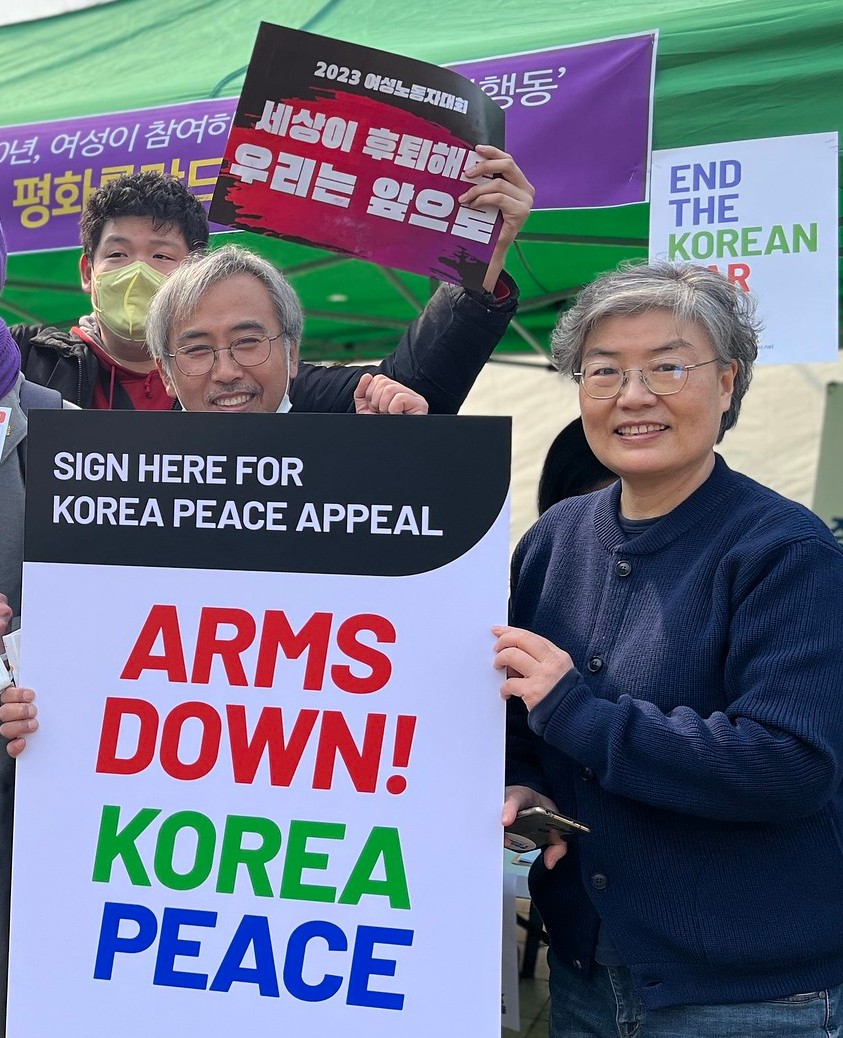 March
4, 2023 action calls for end to Korean War.
March
4, 2023 action calls for end to Korean War. 